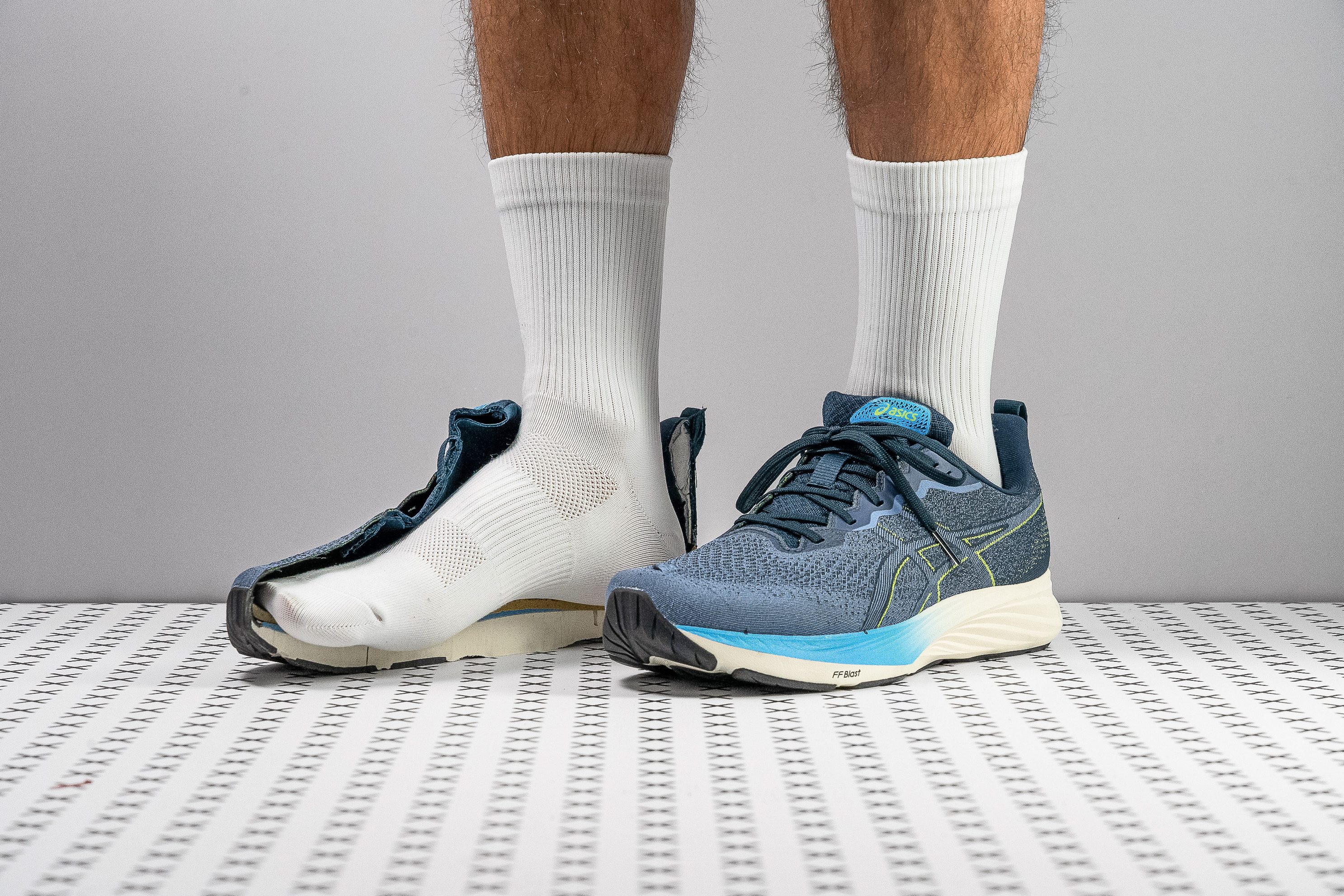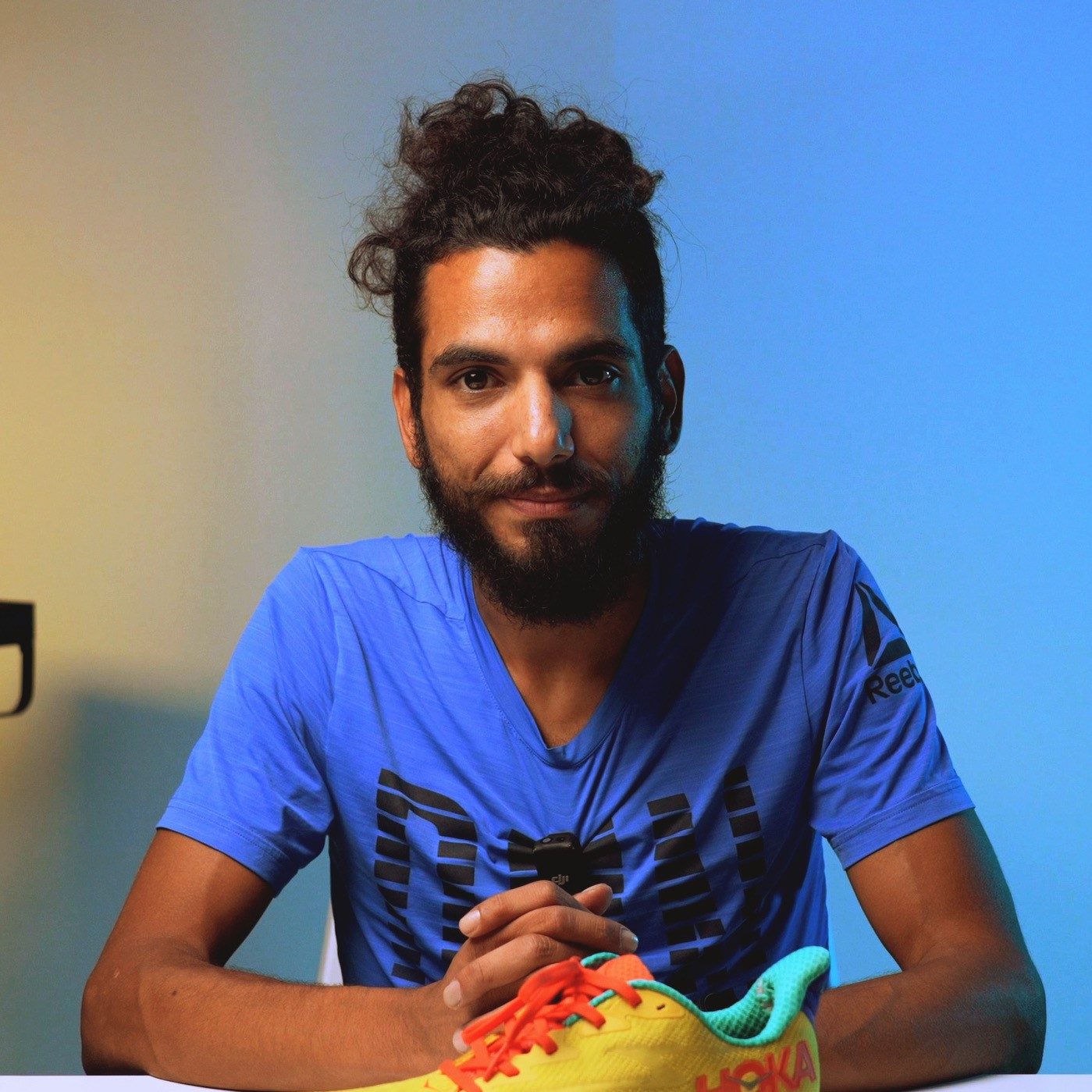Our verdict
- Top pick in best ASICS running shoes (2024)
Pros
- Versatile and comfy
- Great for winter runs
- Quite stable for a neutral shoe
- Flexible and comfy ride
- Impressively durable upper
- Reliable traction
- Good for gym days and general fitness activities
- No break-in needed
- Easy on the wallet
- Sustainable design
- Sustainable design
Cons
- Not for wide feet
- Almost no airflow
- Very thin tongue
- Outsole needs improvements
Audience verdict
- Top 3% in road running shoes
- Top 6% in ASICS running shoes
Comparison
The most similar running shoes compared
+ + Add a shoe | |||||
|---|---|---|---|---|---|
| Audience score | 92 Superb! | 79 Good! | 83 Good! | 92 Superb! | |
| Price | £115 | £65 | £115 | £130 | |
| Pace | Daily running | Daily running | Daily running | Daily running | |
| Shock absorption | Moderate | Moderate | High | High | |
| Energy return | Low | Low | Low | Moderate | |
| Traction | Moderate | Moderate | High | Moderate | |
| Arch support | Neutral | Neutral | Neutral | Neutral | |
| Weight lab Weight brand | 9.2 oz / 262g 9.3 oz / 264g | 9.7 oz / 275g 9.7 oz / 275g | 9.3 oz / 264g 9.2 oz / 260g | 10.1 oz / 285g 9.7 oz / 275g | |
| Drop lab Drop brand | 6.4 mm 8.0 mm | 7.8 mm 8.0 mm | 7.6 mm 8.0 mm | 6.5 mm 6.0 mm | |
| Strike pattern | Mid/forefoot | Mid/forefoot | Mid/forefoot | Mid/forefoot | |
| Size | True to size | True to size | True to size | True to size | |
| Midsole softness | Balanced | Balanced | Balanced | Soft | |
| Difference in midsole softness in cold | Small | Small | Normal | Normal | |
| Toebox durability | Good | Bad | Good | Decent | |
| Heel padding durability | Good | Good | Good | Bad | |
| Outsole durability | Good | Decent | Good | Good | |
| Breathability | Warm | Moderate | Moderate | Moderate | |
| Width / fit | Narrow | Medium | Medium | Narrow | |
| Toebox width | Medium | Medium | Medium | Medium | |
| Stiffness | Moderate | Moderate | Moderate | Moderate | |
| Torsional rigidity | Moderate | Moderate | Stiff | Stiff | |
| Heel counter stiffness | Stiff | Stiff | Stiff | Moderate | |
| Rocker | ✗ | ✗ | ✗ | ✓ | |
| Heel lab Heel brand | 32.6 mm 34.0 mm | 31.2 mm 31.0 mm | 39.4 mm 39.0 mm | 34.1 mm 38.0 mm | |
| Forefoot lab Forefoot brand | 26.2 mm 26.0 mm | 23.4 mm 23.0 mm | 31.8 mm 31.0 mm | 27.6 mm 32.0 mm | |
| Widths available | Normal | NormalWideX-Wide | Normal | Normal | |
| Orthotic friendly | ✓ | ✓ | ✓ | ✓ | |
| Season | Winter | All seasons | All seasons | All seasons | |
| Removable insole | ✓ | ✓ | ✓ | ✓ | |
| Ranking | #17 Top 3% | #335 Bottom 12% | #277 Bottom 27% | #6 Top 2% | |
| Popularity | #546 Bottom 20% | #70 Top 19% | #204 Bottom 46% | #264 Bottom 31% |
Who should buy
We recommend the ASICS Dynablast 4 as an excellent choice for:
- Beginner runners in the market for a versatile and long-lasting daily trainer that's easy on the wallet
- Runners looking for a well-cushioned neutral road shoe that's responsive enough for longer runs and some speedwork
- Active individuals looking for a flexible and comfortable shoe that's good for walking and gym days too
- Those in cooler climates who need a shoe that keeps their feet warm and stays supple in frigid conditions
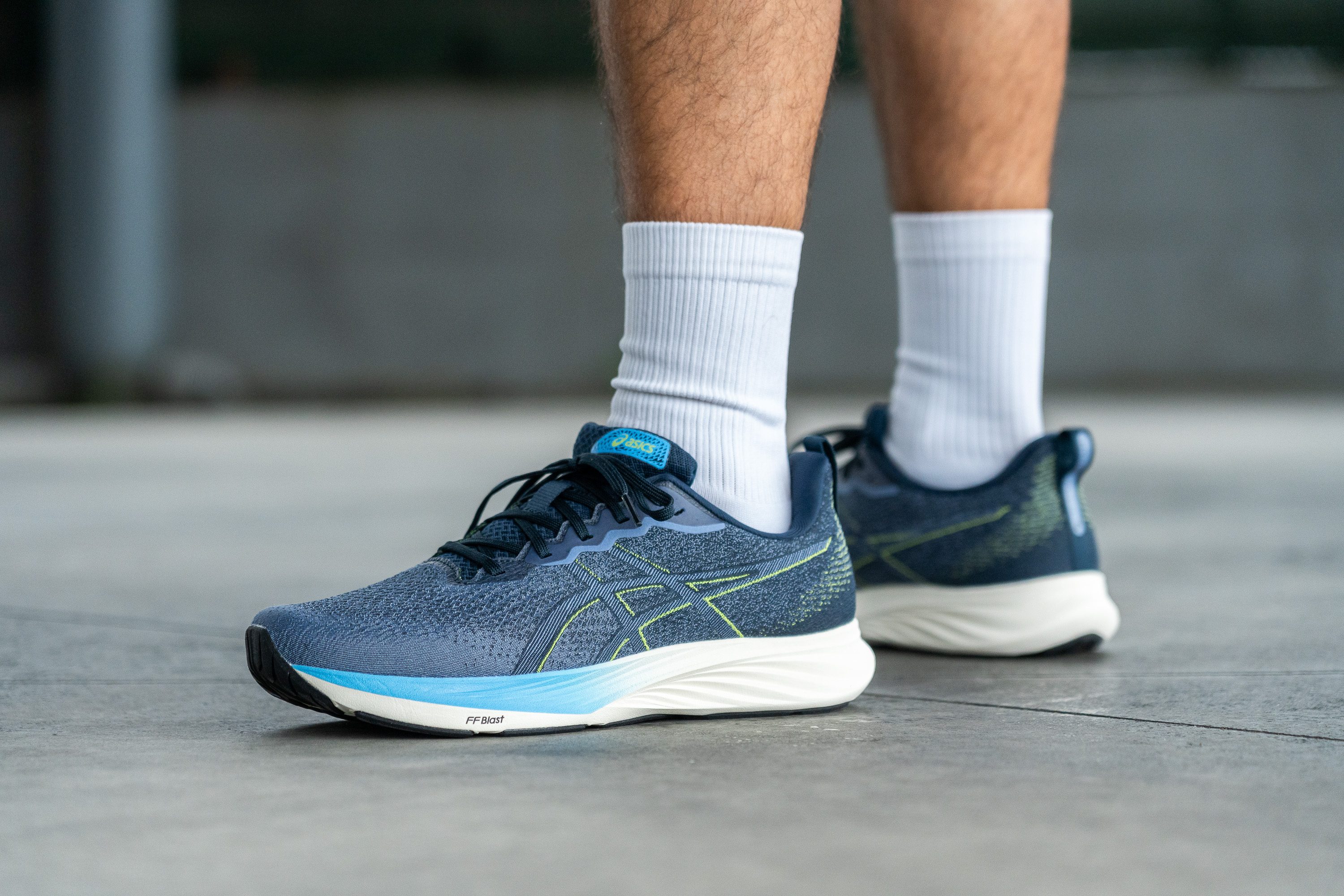
Who should NOT buy
Our smoke test reveals that the Dynablast 4 suffers from a distinct lack of airflow. This was extremely apparent during our test runs on warmer days where the shoe felt more like a foot sauna. The ASICS Jolt 4 is another wallet-friendly alternative with a much more breathable upper mesh that keeps our feet feeling nice and breezy.
The Dynablast 4's FF Blast midsole is certainly responsive and brings some fun to our daily runs. That said, it doesn't match the zippy energy return we enjoyed with their more premium FF Blast+ foam found in the ASICS Novablast 4. We recommend that as a speedier alternative for more serious runners looking to hit some PBs.
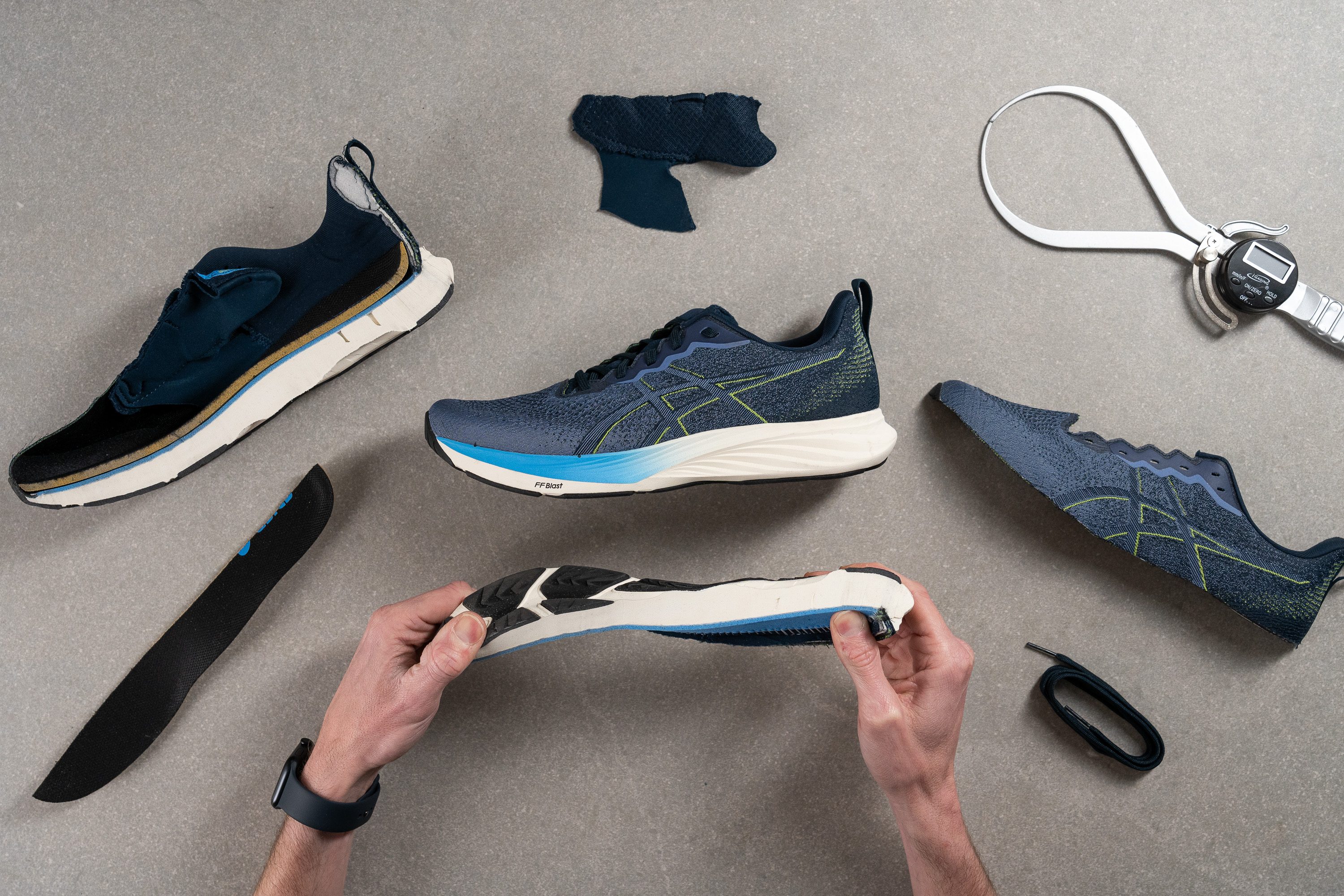
With a slightly narrower-than-average toebox according to our calliper measurements, the Dynablast 4 isn't the best option for runners with broad feet. For those runners, we suggest checking out the roomier Adidas Supernova 2 as an alternative.
The Dynablast 4 also boasts a paper-thin tongue which means that the laces did feel quite apparent across our instep during testing. The ASICS Gel Cumulus 25 has a beefier tongue that doesn't add that much weight to the shoe.
Cushioning
Shock absorption
The Dynablast 4 features a midsole that delivers solid impact protection at 124 SA—right in line with the average. This makes it a highly-adaptable option for everything from daily jogs to medium-distance runs.
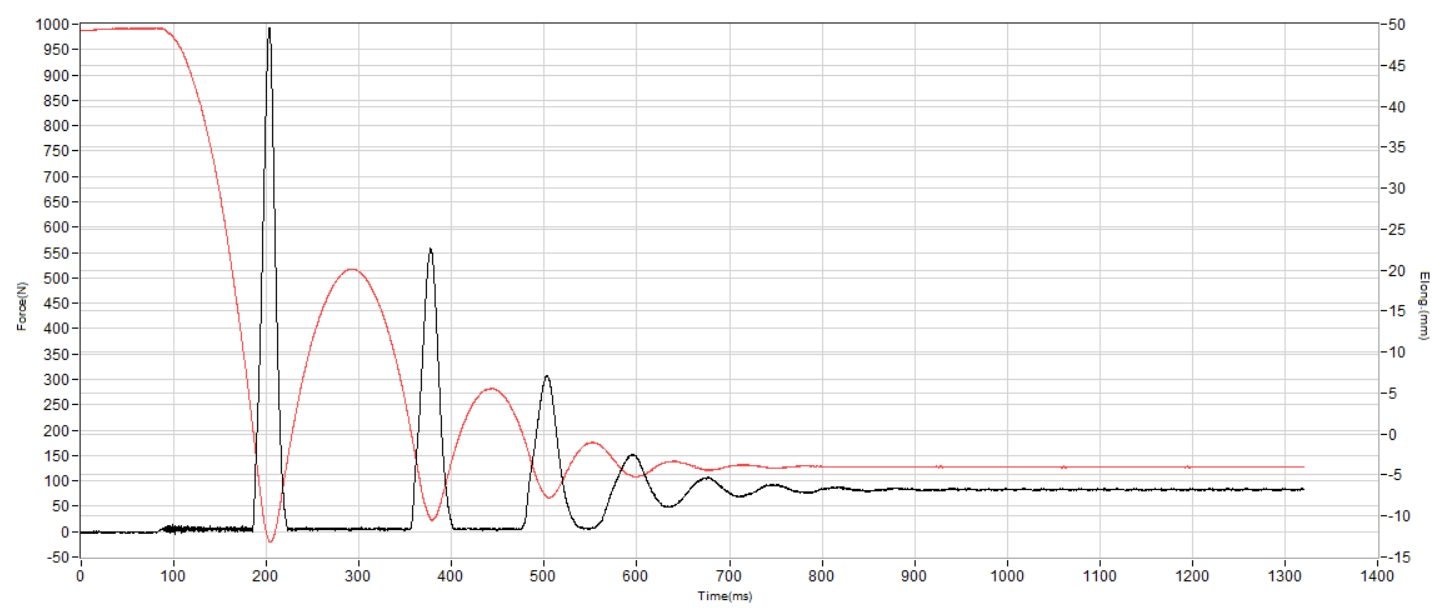
| Dynablast 4 | 124 SA |
| Average | 130 SA |
Energy return
Energy return is low at just 48.4%, so this isn’t a springy ride by any stretch. That said, we found that bounce tends to rise with price, so it’s no shock that the Dynablast 4 sits near the bottom.
| Dynablast 4 | 48.4% |
| Average | 58.6% |
Heel stack
While stated to be 34 mm thick by ASICS themselves, the Dynablast 4's stack is 32.6 mm thick at the heel according to our caliper measurements. That said, this is on par with our current lab average and gives us a good amount of foam underfoot to dampen our landings effectively while testing the shoe.
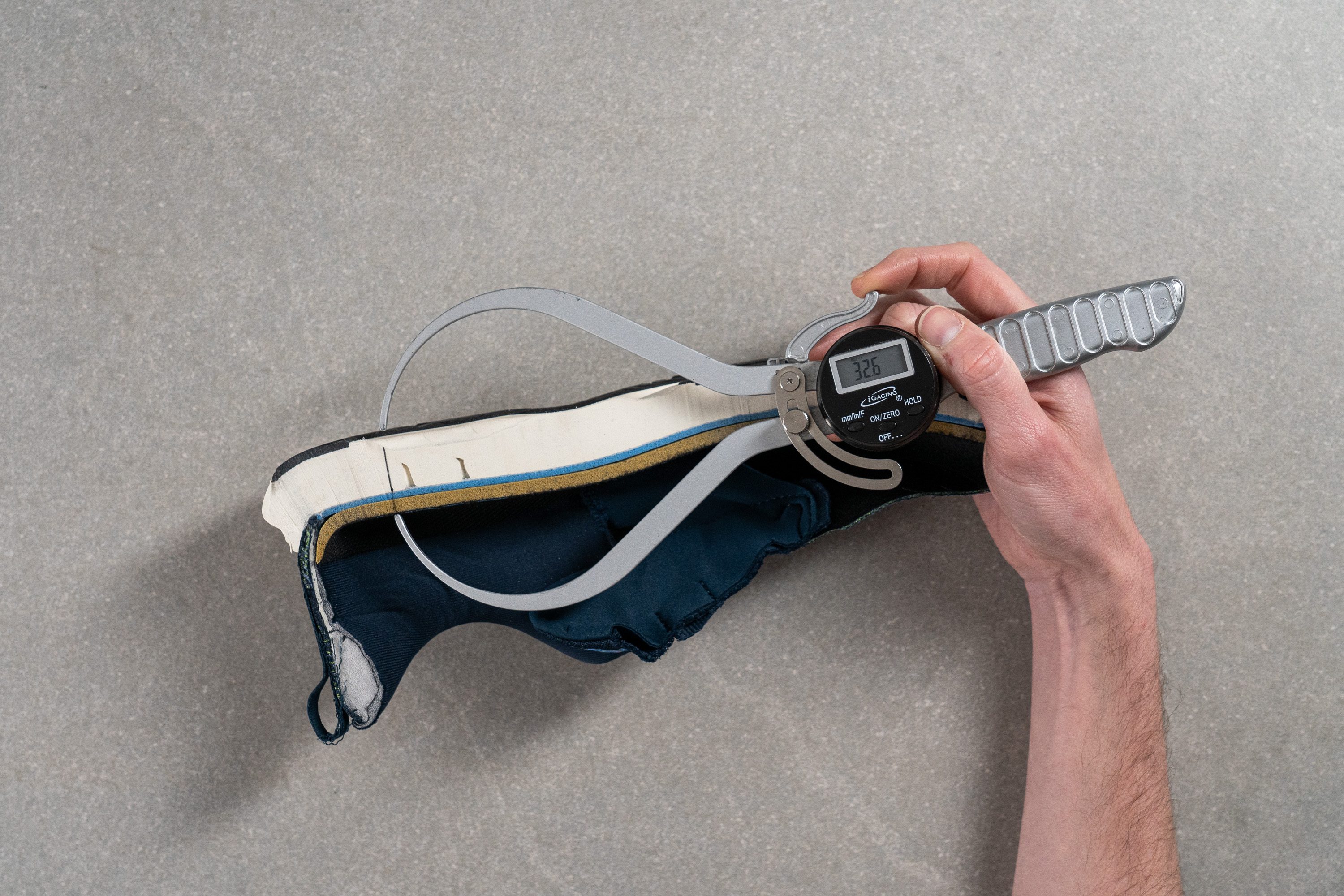
| Dynablast 4 | 32.6 mm |
| Average | 34.8 mm |
Forefoot stack
ASICS' stack measurement of 26 mm at the forefoot, on the other hand, is much more accurate. At 26.2 mm according to our calliper, the Dynablast 4's stack is ever so slightly higher than our current lab average.
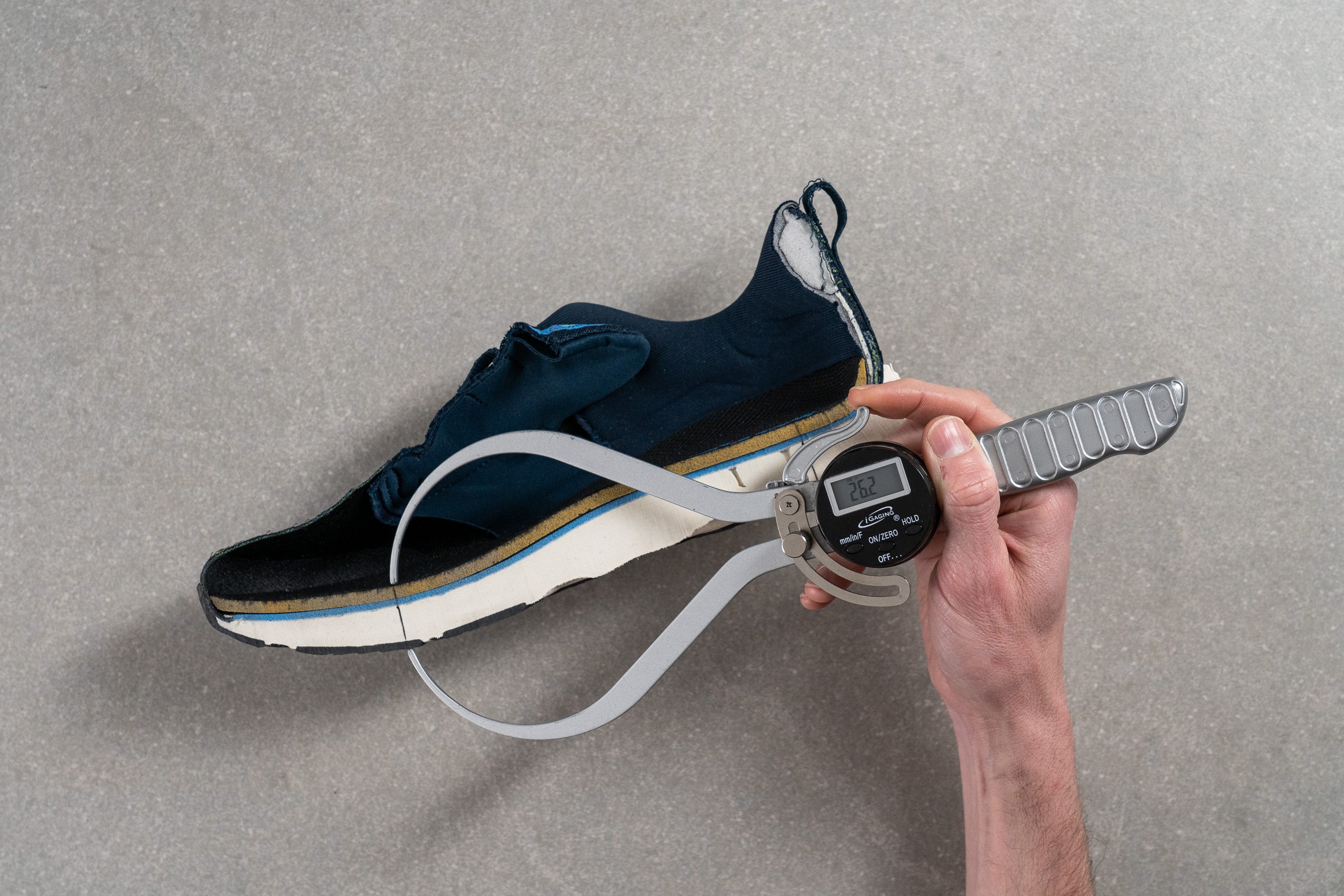
Having this much foam at the forefoot means that we felt well-cushioned from landing to toe-off, even during our longer test runs.
| Dynablast 4 | 26.2 mm |
| Average | 26.2 mm |
Drop
The slight discrepancy we found with the stack measurements trickles down to the drop height which is actually 6.4 mm as opposed to the 8 mm as stated by ASICS. We've come across many similar discrepancies here in the lab, as this article explores.
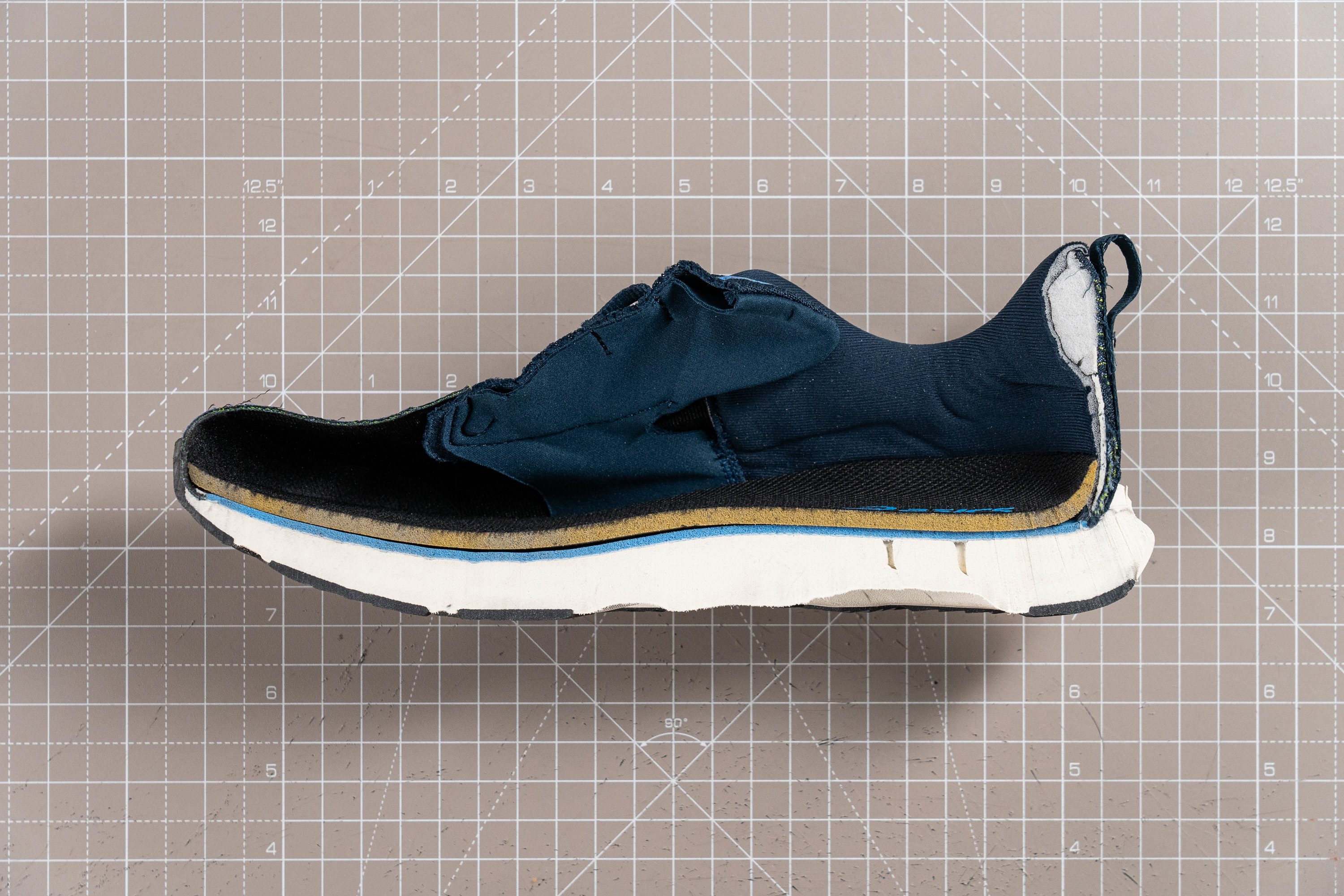
However, this deviation isn't as egregious as others we've found as the Dynablast 4 still falls in the category of mid-drop shoes. This offset is suitable for a wide variety of runners as it feels comfortable regardless of foot strike; whether heel or mi/forefoot.
| Dynablast 4 | 6.4 mm |
| Average | 8.6 mm |
Midsole softness
The Dynablast 4 uses ASICS' FF Blast midsole foam which registers a reading of 23 HA on our durometer. This is only marginally firmer than our current lab average and still provides us with a nice and balanced level of cushioning that effectively dampens impact over just about any distance.
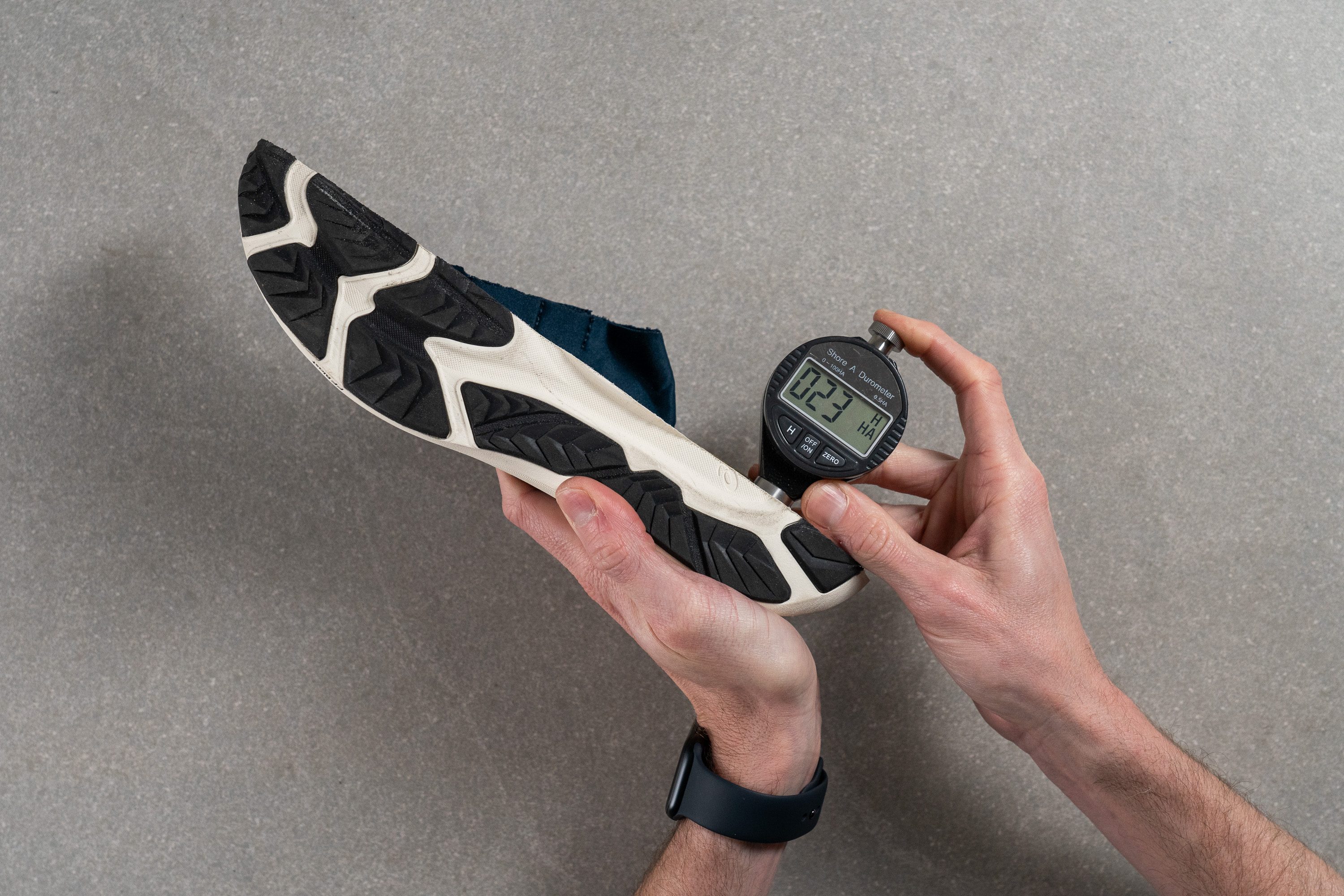
Furthermore, the shoe's healthy stack really allows us to sink in and savour that foam as it compresses under our weight, making it feel a little softer underfoot than the durometer might suggest. This also means that the shoe doesn't bottom out, making it a good choice for more heavyset runners.
Apart from the cushioning, the FF Blast midsole also has a nice pop to it, giving us an energetic toe-off that brings some fun to our runs and allows us to pick up the pace at will. That said, it doesn't match the energy levels of their more premium FF Blast+ foam found in shoes like the Novablast 4 that we recommend for more serious runners looking for more performance from their daily trainers.
| Dynablast 4 | 23.0 HA |
| Average | 20.4 HA |
Size and fit
Size
ASICS Dynablast 4 fits true to size (25 votes).
Internal length
| Dynablast 4 | 277.6 mm |
| Average | 269.4 mm |
Width / Fit
Using our caliper, we measured the Dynablast 4's toebox to be 97.3 mm wide at its widest point. This is about average width and should comfortably accommodate those with narrow to normal-width fit. Furthermore, the upper itself is well-padded and has a soft inner lining.
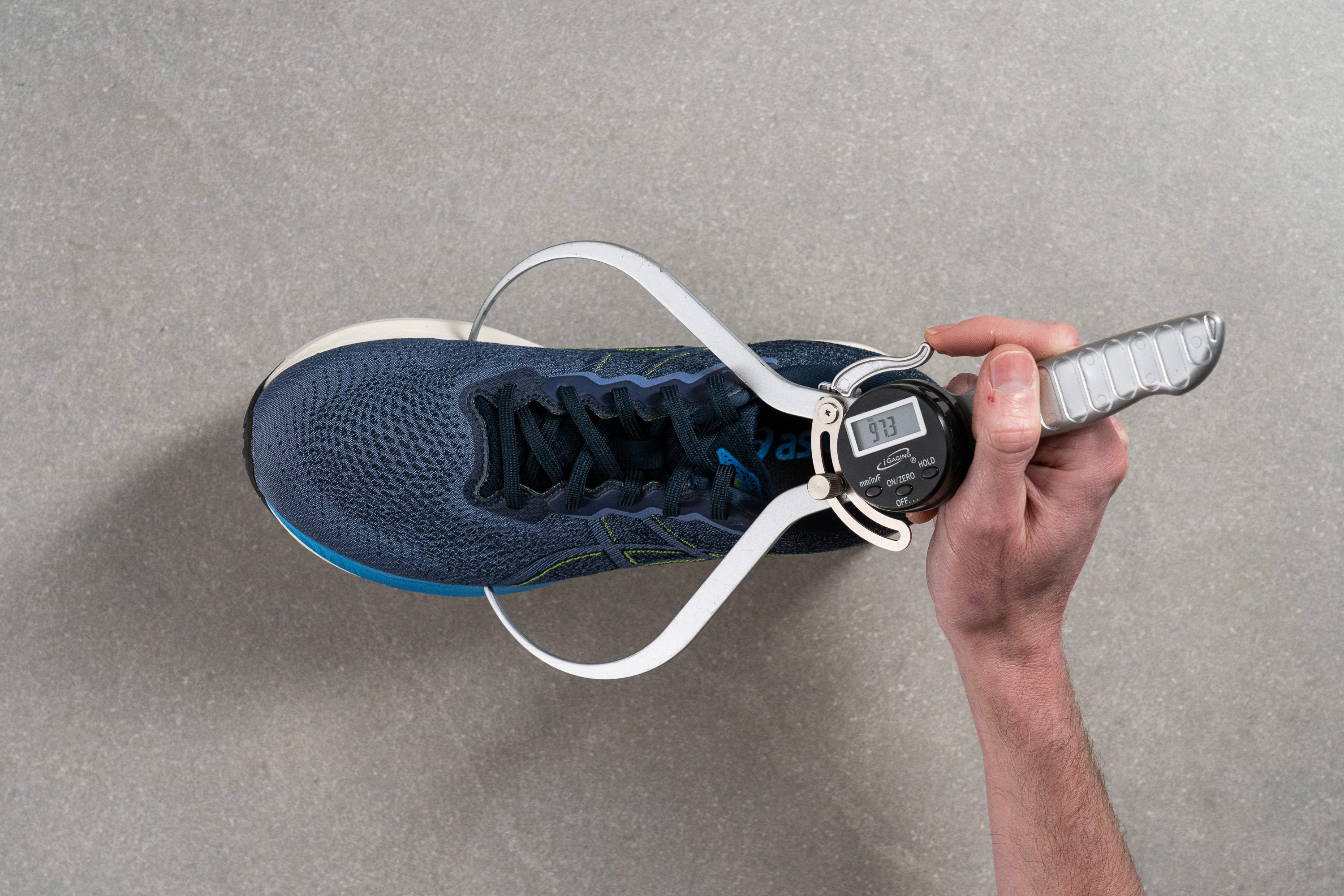
Runners with broad feet, on the other hand, will likely feel constricted and experience hotspots in this part of the shoe as the woven upper doesn't have much give to it either. We recommend the Adidas Supernova Rise as an alternative with more internal real estate.
This test follows an older methodology, which is why you don't see recently tested shoes in the chart. Results from different methodologies can not be compared.
| Dynablast 4 | 97.3 mm |
| Average | 98.5 mm |
Toebox width
The toebox taper to 77 mm wide at the big toe according to our caliper measurements which is just shy of our current lab average. This gives us a good amount of toe room to splay out without feeling squeezed in by the toebox.
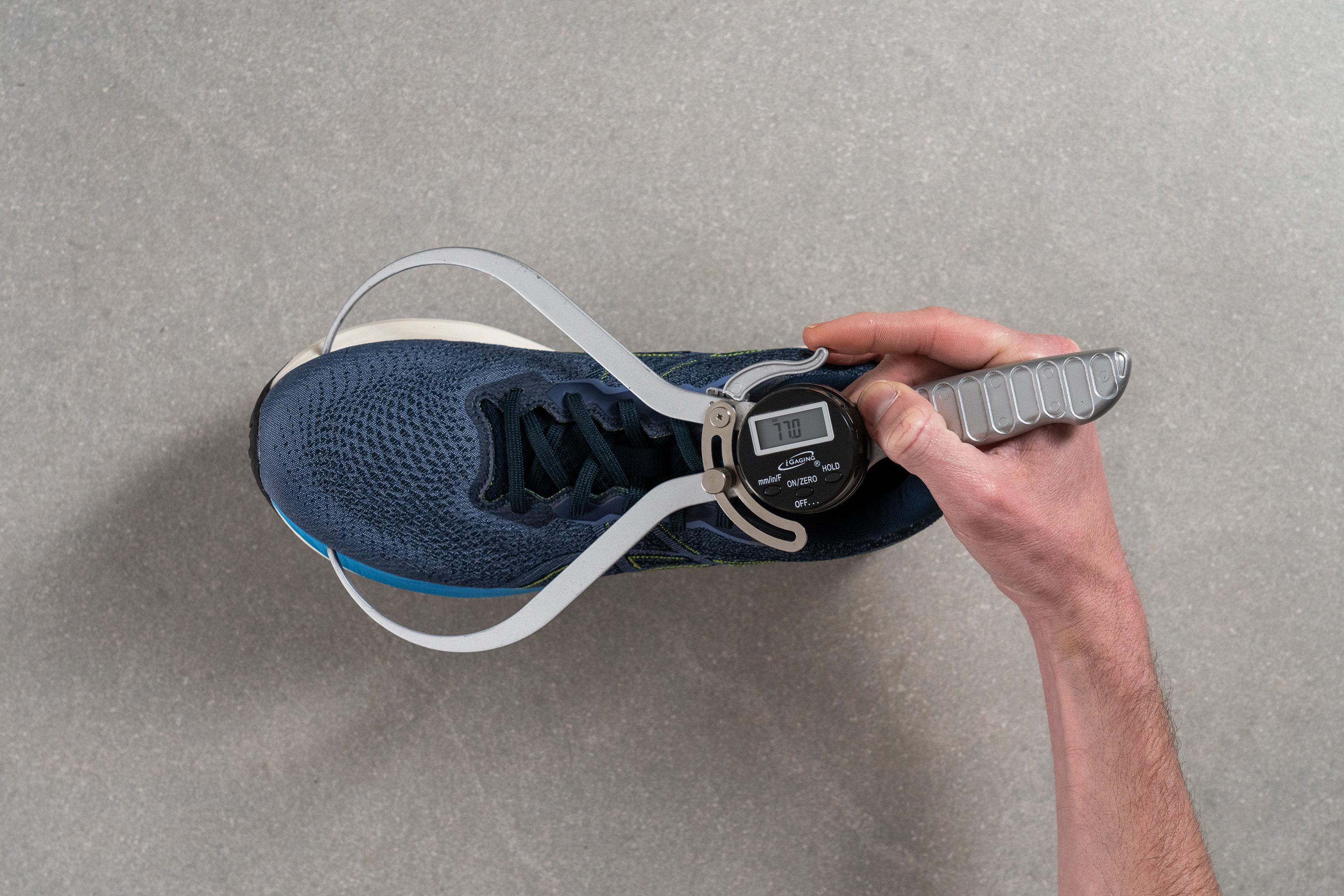
This test follows an older methodology, which is why you don't see recently tested shoes in the chart. Results from different methodologies can not be compared.
| Dynablast 4 | 77.0 mm |
| Average | 78.4 mm |
Traction / Grip
Traction test
The Dynablast 4 delivered good grip on dry pavement but felt uncertain on slick surfaces, scoring just 0.34 in our lab test. Still, considering its budget-friendly status, we weren’t expecting high-end performance from this outsole.
| Dynablast 4 | 0.34 |
| Average | 0.49 |
Outsole design
The ASICS Dynablast 4 features partial rubber coverage with thick, strategically placed segments in the forefoot, heel, and lateral midfoot. These black rubber pieces are embedded into the EVA-based midsole, which remains exposed throughout the central area of the outsole.
Multiple deep flex grooves are carved across the rubber zones, enhancing segmentation between each layer of rubber.
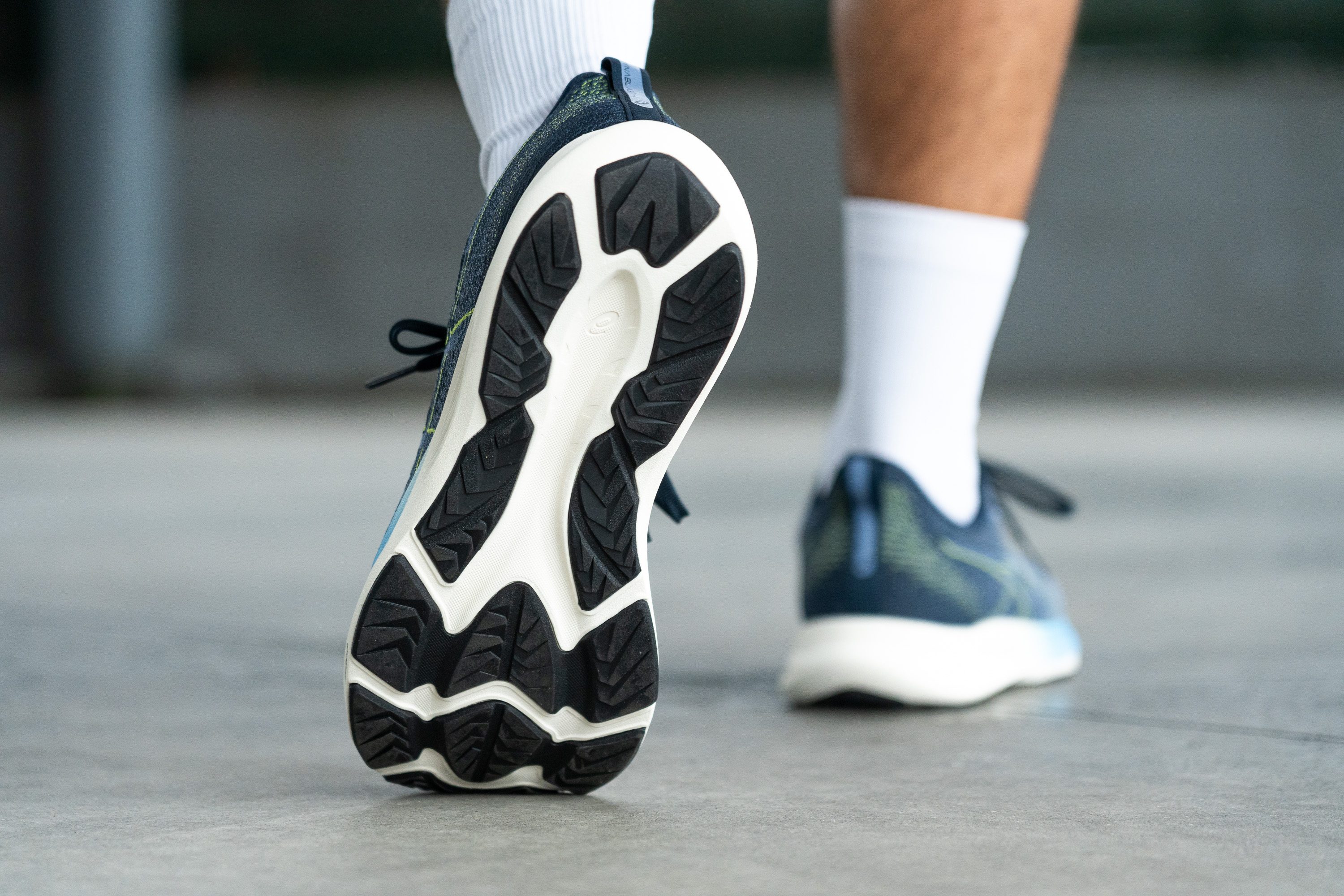
Flexibility / Stiffness
With just 11.4N needed to reach 30 degrees in our flex test, the Dynablast 4 is more flexible than the average road shoe. It moves easily with the foot and works well for walking and jogging too.
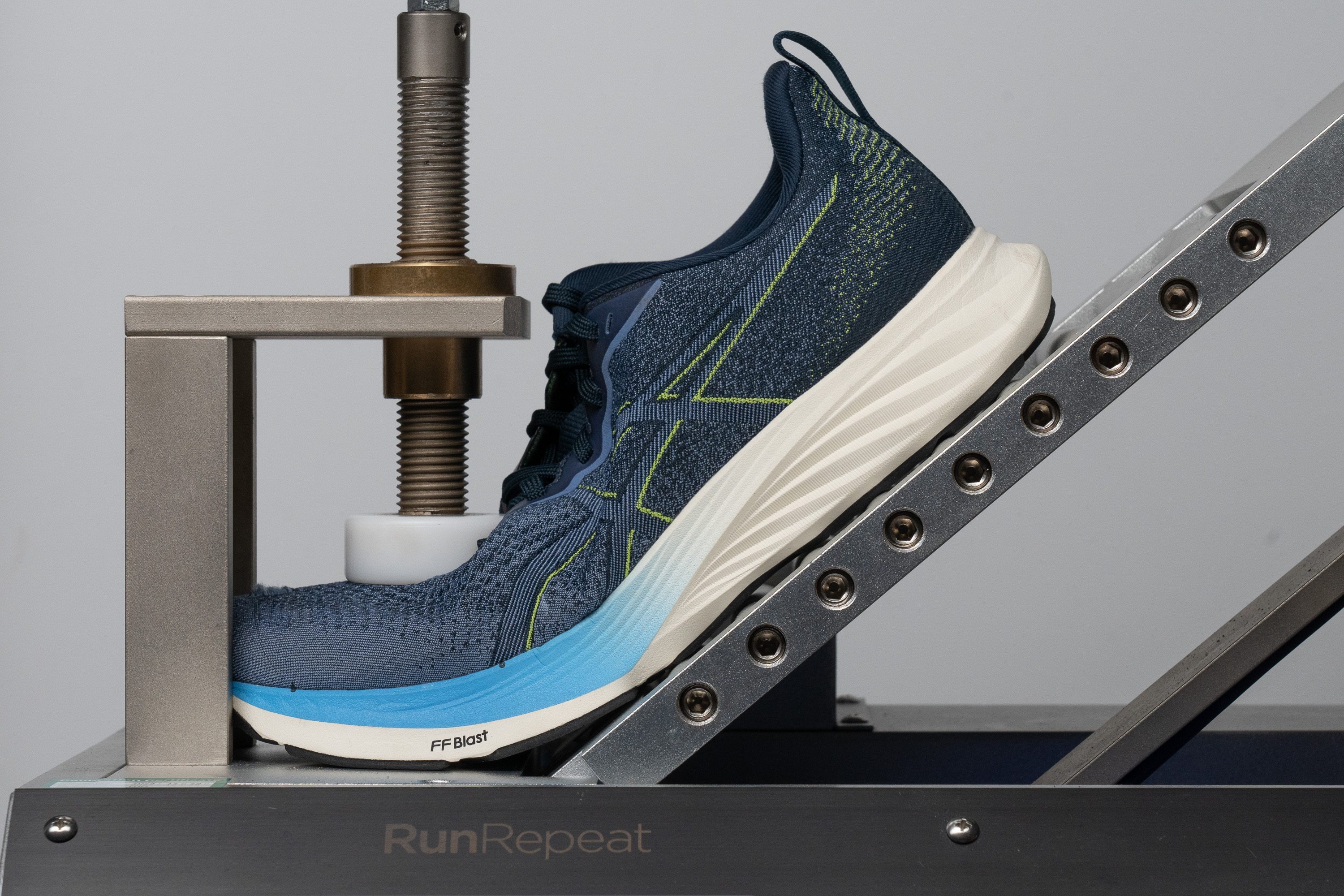
| Dynablast 4 | 11.4N |
| Average | 15.3N |
Stiffness in cold (%)
We also repeated the flex test after chilling the Dynablast 4 in our freezer for twenty minutes and were, again, impressed by its incredibly consistent performance. It only became 7.3% stiffer when exposed to the cold, a difference that's almost insignificant and will barely be perceptible underfoot. When combined with the midsole's post-freezer performance as well as the shoe's toasty upper, the Dynablast 4 is an excellent choice for runners in colder climates looking for a shoe that will remain reliable and comfy no matter how frosty it gets.
| Dynablast 4 | 7% |
| Average | 33% |
Weight
Tipping the scale at 9.2 oz (262g), the Dynablast 4 is about as heavy as the average road shoe. As such, the shoe doesn't feel overly burdensome underfoot whether we were out for recovery runs or more intense tempo or distance sessions.
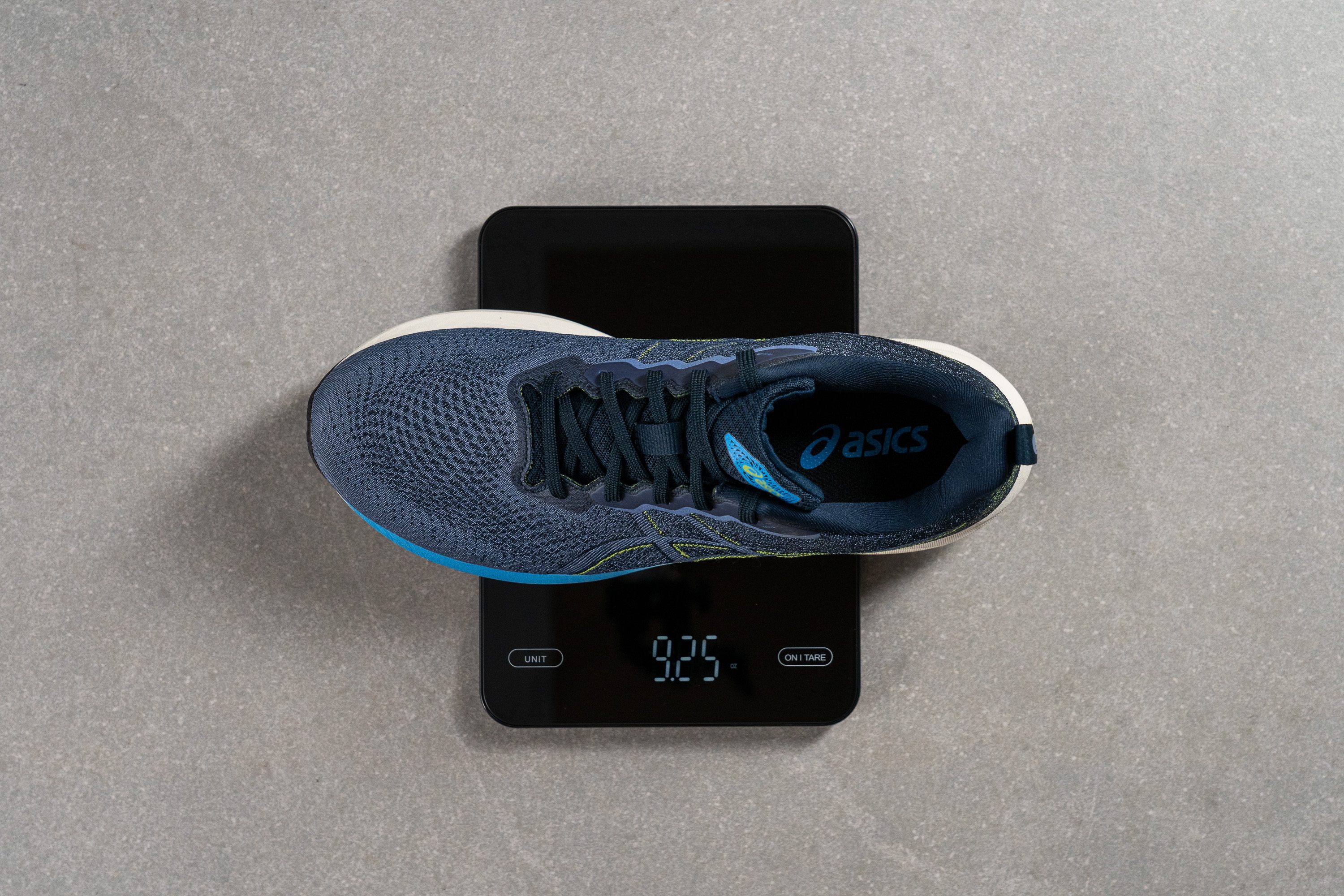
| Dynablast 4 | 9.2 oz (262g) |
| Average | 9.3 oz (264g) |
Breathability
We put the Dynablast 4 through our state-of-the-art smoke test to assess its breathability. As the footage demonstrates, the results aren't too promising. Only little wisps of smoke are eventually able to sputter out the tongue. This indicates that the upper traps in a lot of heat, leading us to give the Dynablast 4 the lowest score of 1 out of 5 for breathability.
This is further corroborated when inspecting a cross-section of the shoe over a backlight. The dense upper blocks out the light entirely, a quality we've come to associate with badly ventilated shoes.
Our microscope image of the Dynablasts 4's engineered woven upper reveals a compact network of tightly braided fibres with no visible gaps for airflow. While this certainly isn't ideal for runs on hot summer days, the shoe does keep our feet nice and warm on those chilly early morning efforts in winter and spring.
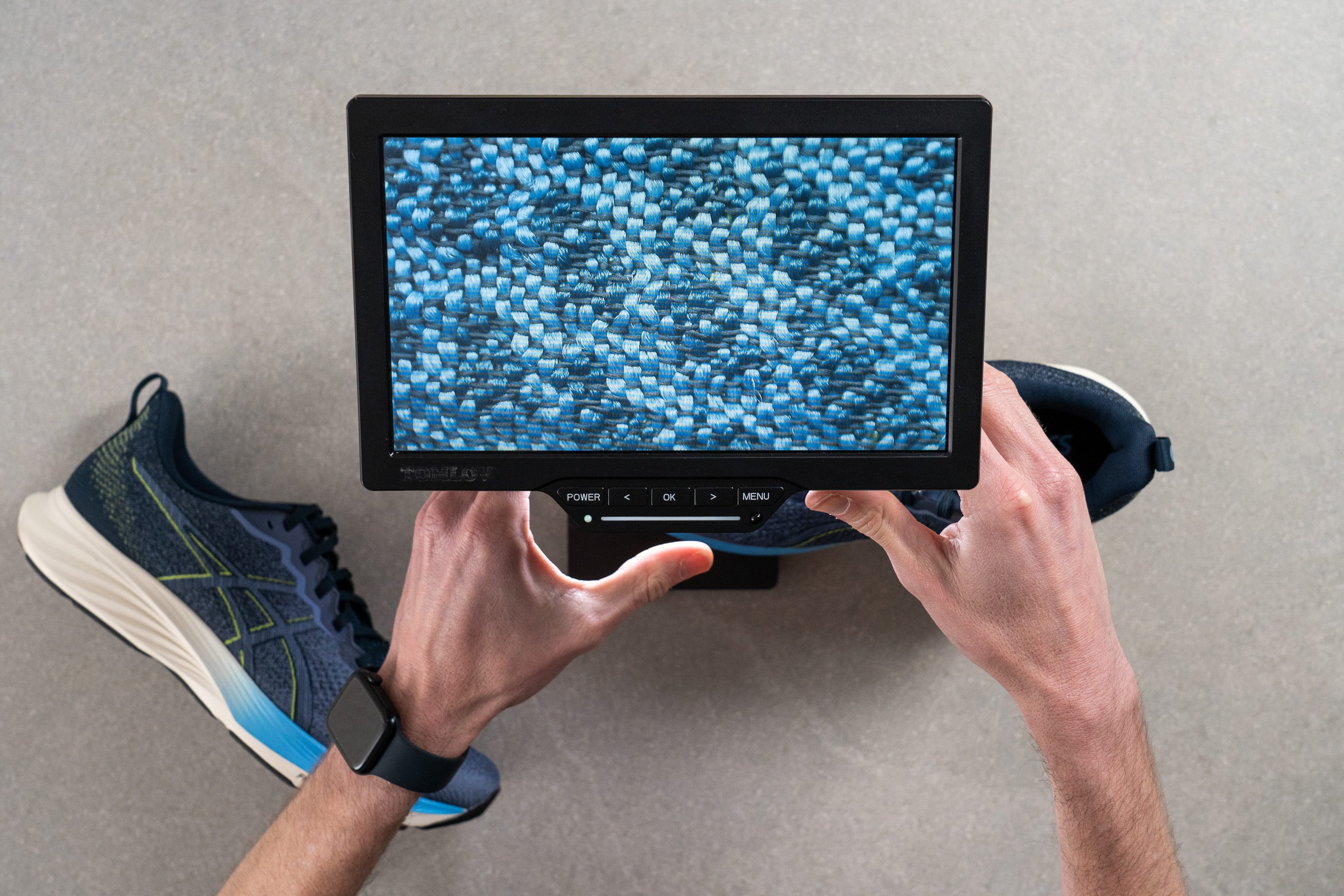
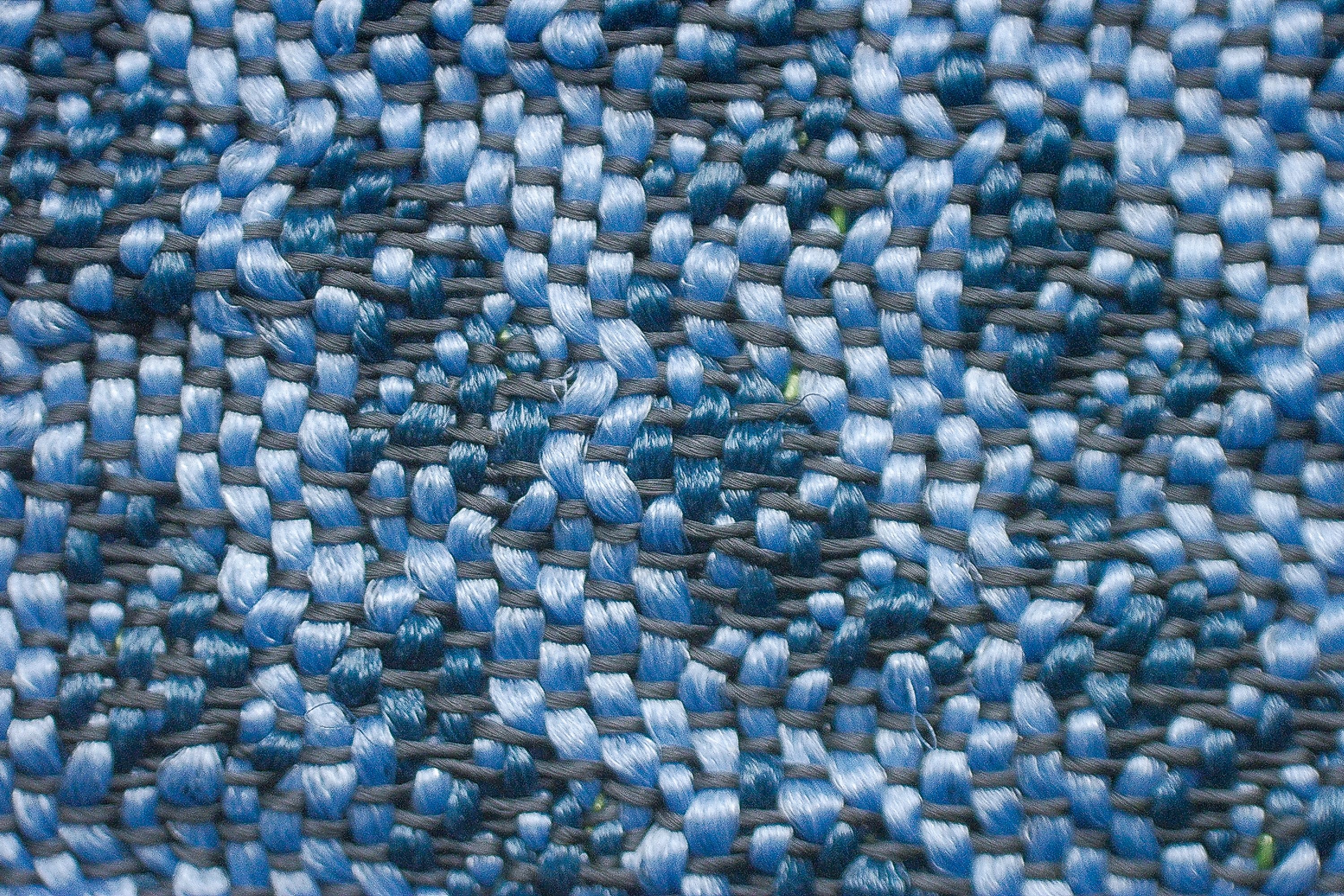
| Dynablast 4 | 1 |
| Average | 3.7 |
Stability
Lateral stability test
The Dynablast 4 feels quite stable underfoot despite its healthy stack, with the shoe remaining pretty well-planted as we shift our weight from side to side. That said, however, as a neutral trainer it doesn't feature any features that limit lateral movements or overpronation. Therefore, we recommend that overpronating runners check out the ASICS GT 1000 12 as a more suitable alternative to prevent injuries.
Torsional rigidity
We encountered a fair amount of resistance as we bent and twisted the shoe in our hands, leading us to give the Dynablast 4 a torsional rigidity score of 3 out of 5. This middle-of-the-road stiffness ensures that we always have a relatively level and stable landing platform underfoot while still being easy and forgiving on our feet.
| Dynablast 4 | 3 |
| Average | 3.5 |
Heel counter stiffness
The heel counter is well-structured and generously padded, giving it a level of stiffness that we scored 4 out of 5 in our manual assessment. This holds our rearfoot in place securely but allows for some minimal lateral movements, offering up a healthy mix of comfort and stability during our test runs.
| Dynablast 4 | 4 |
| Average | 2.9 |
Midsole width - forefoot
A key factor in the Dynablast's well-cushioned yet stable ride is the breadth of its midsole at the forefoot. At 115.4 mm wide according to our calliper measurements, it's significantly wider than our current lab average. This affords us a broad and steady base that keeps us rock-steady as we transition to toe-off.
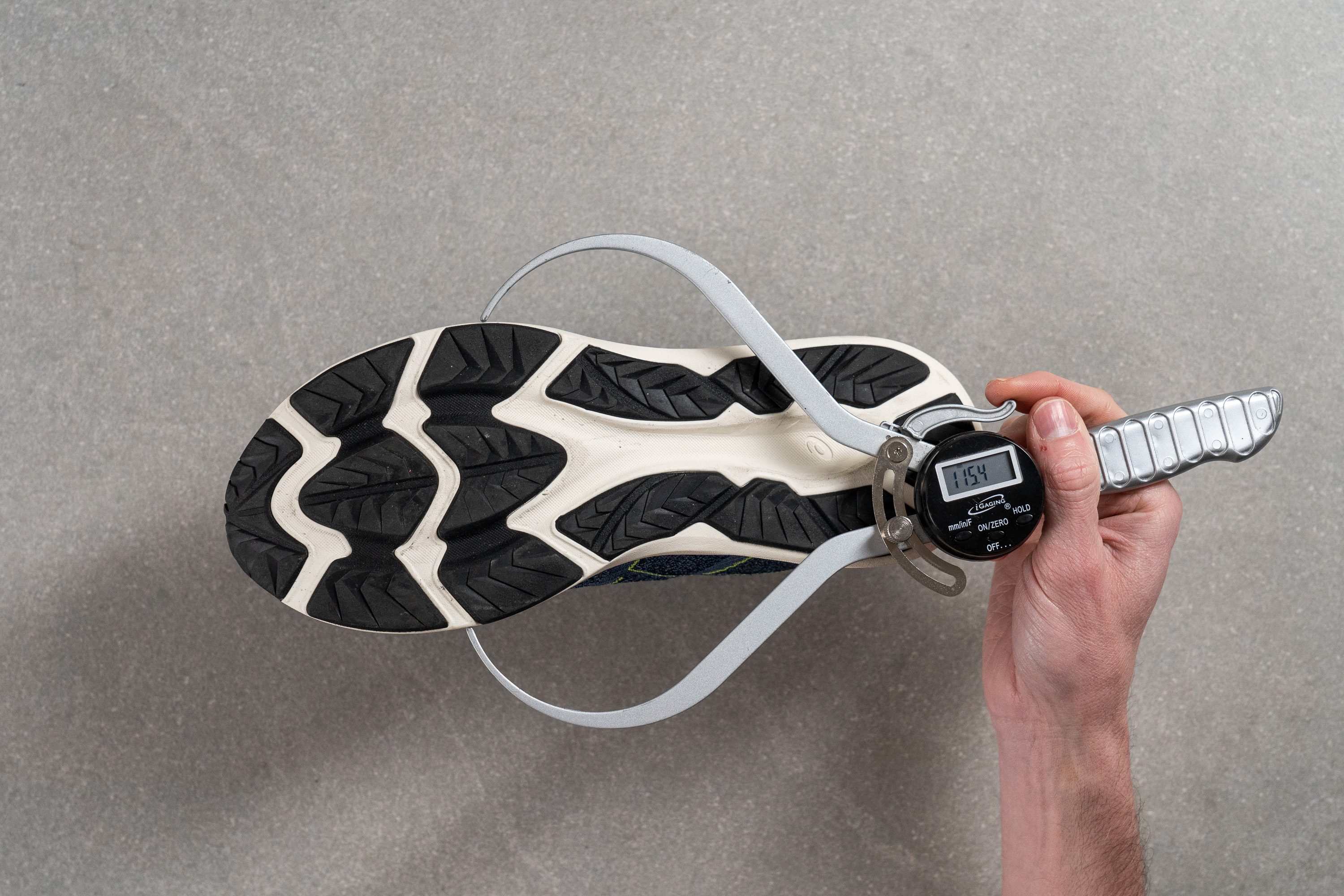
Despite how wide it is up at the forefoot, the Dynablast 4 is still quite nimble and doesn't feel too blocky or clunky on corners.
| Dynablast 4 | 115.4 mm |
| Average | 114.4 mm |
Midsole width - heel
The midsole falls more in line with our current lab average back at the heel, measuring 90.4 mm wide according to our caliper. As such, heel strikers should also have more than enough of a platform underfoot to ensure stable landings while the shoe inherits a sleek, aerodynamic silhouette.
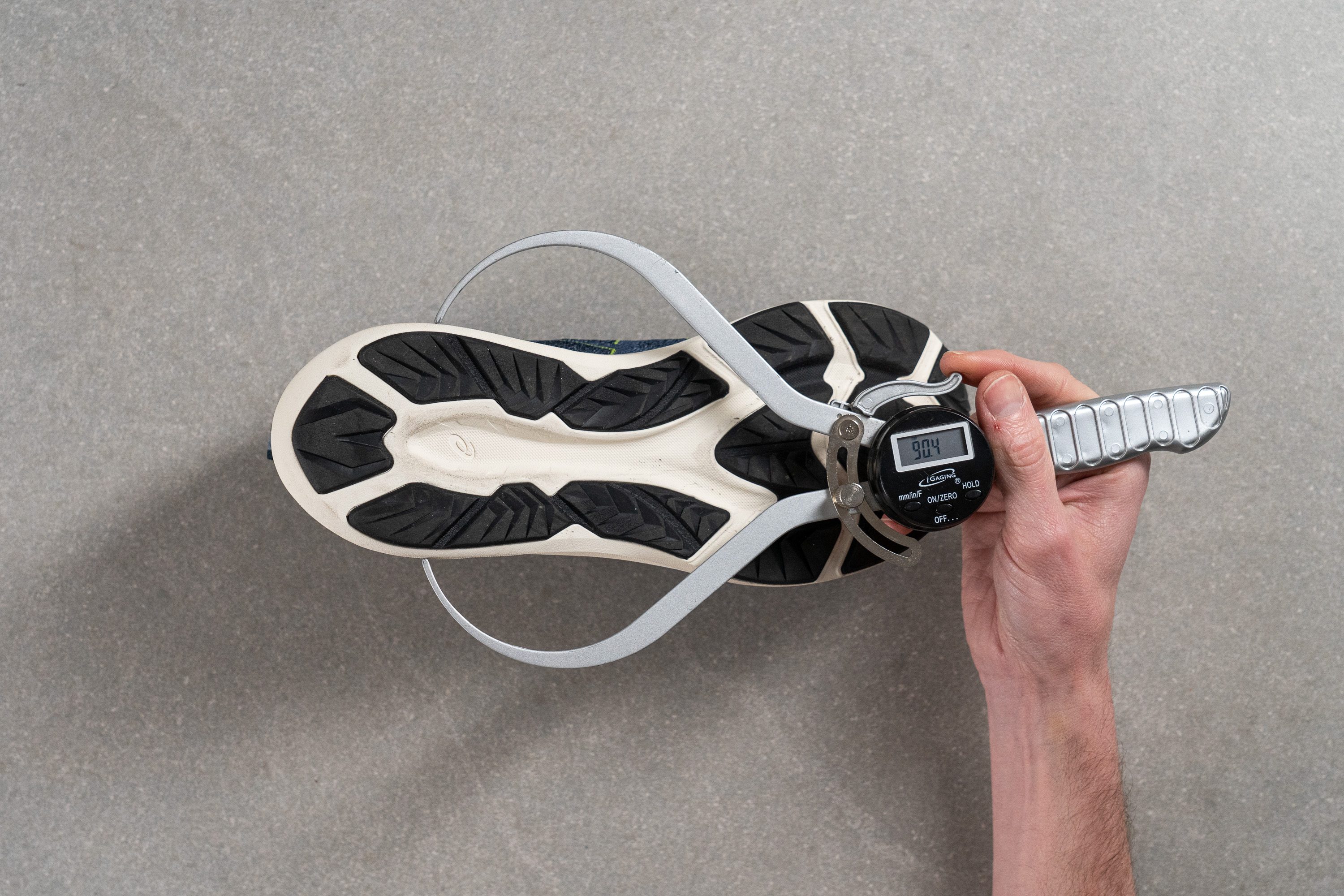
| Dynablast 4 | 90.4 mm |
| Average | 90.6 mm |
Durability
Toebox durability
For what the Dynablast 4's woven upper lacks in breathability, it more than makes up for with resilience. To simulate extreme wear and tear, we fired up our Dremel's abrasive element to 5K RPM and set it against the toebox with 3.2N of force.
While this test usually has catastrophic results on mesh uppers, as is clear with the crater we left in the Gel Pulse 13's toebox, the Dynablast 4 walked away with very little damage. This earns the Dynablast 4 a very respectable 4 out of 5 for toebox durability. It's going to take a lot more than a few bumps or scrapes to compromise the integrity of this shoe.
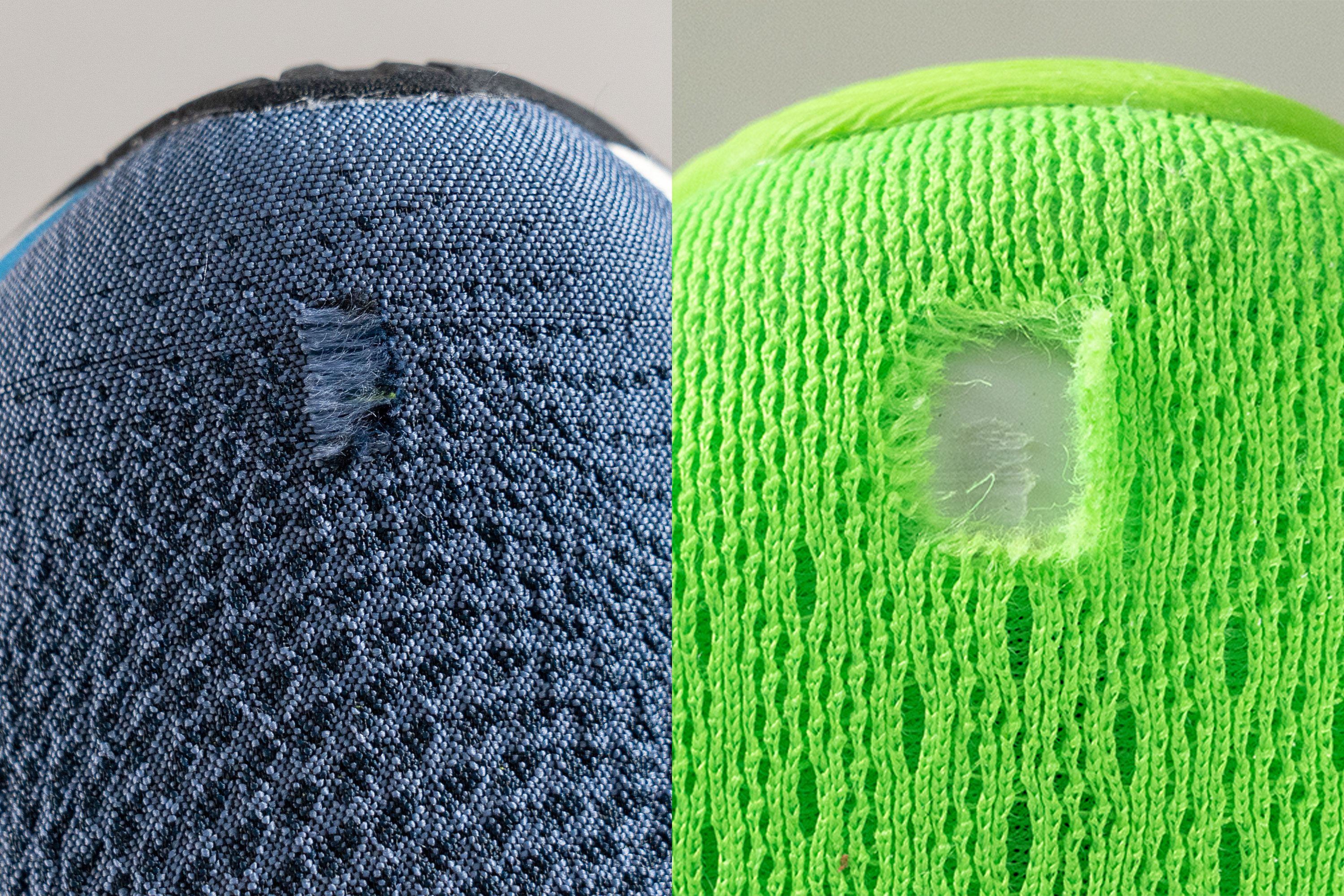
| Dynablast 4 | 4 |
| Average | 2.6 |
Heel padding durability
Next, we turn our attention to the heel collar and set our Dremel against the Dynablast 4 once more.
After four seconds, we found that our tool had only managed to mangle to lining, with the soft padding within left relatively intact. We, therefore, give the shoe another strong 4 out of 5 in this assessment. This is extremely impressive, especially for such a budget-friendly shoe, as it indicates the high quality of the materials used in the Dynablast 4's upper.
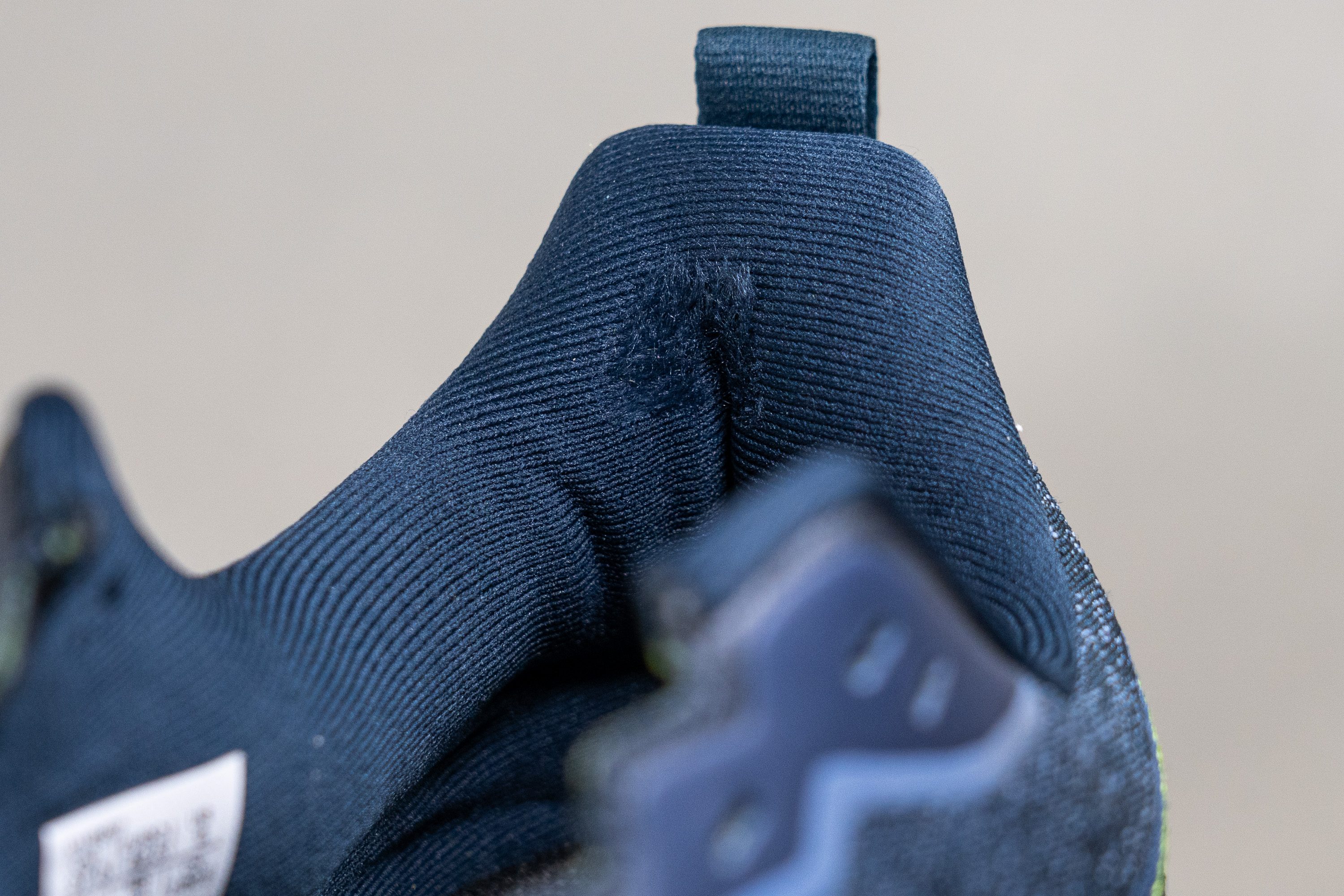
| Dynablast 4 | 4 |
| Average | 3.4 |
Outsole hardness
The Dynablast 4's outsole is slightly harder than average, registering a reading of 83.1 HC on our durometer. Based on our findings in the lab so far, a harder outsole usually indicates better strength; a claim that will be put to the test by our Dremel in the next section.
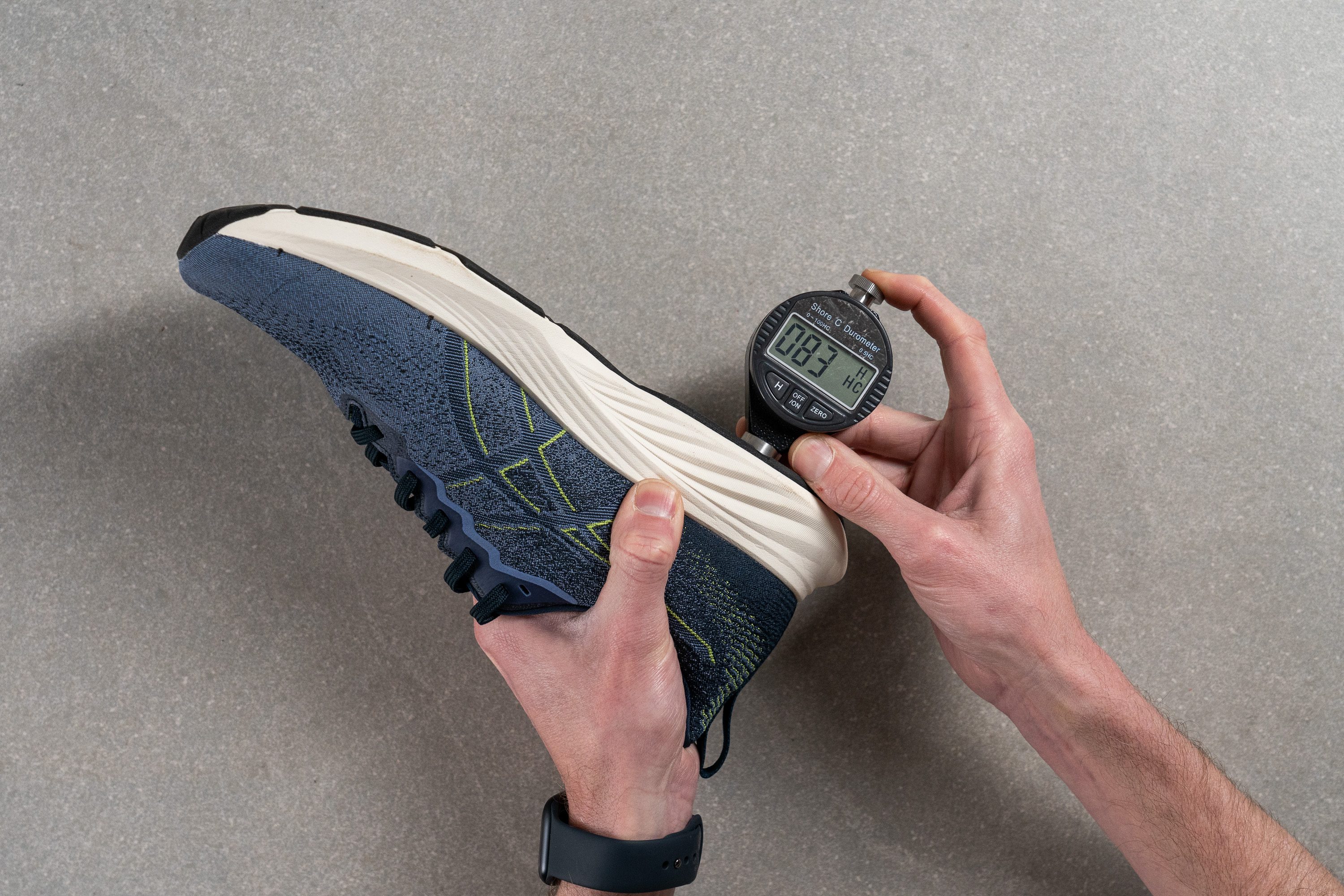
| Dynablast 4 | 83.1 HC |
| Average | 79.2 HC |
Outsole durability
Now spinning at 10K RPM, we set our Dremel's abrasive element against the outsole for twenty-two seconds of relentless grinding.
We then used a tyre tread gauge to measure the indentation left behind in the wake of the test and found our previous claim to hold water this time. With only 0.6 mm of material lost, the Dynablast 4's outsole is a little more durable than our current lab average.
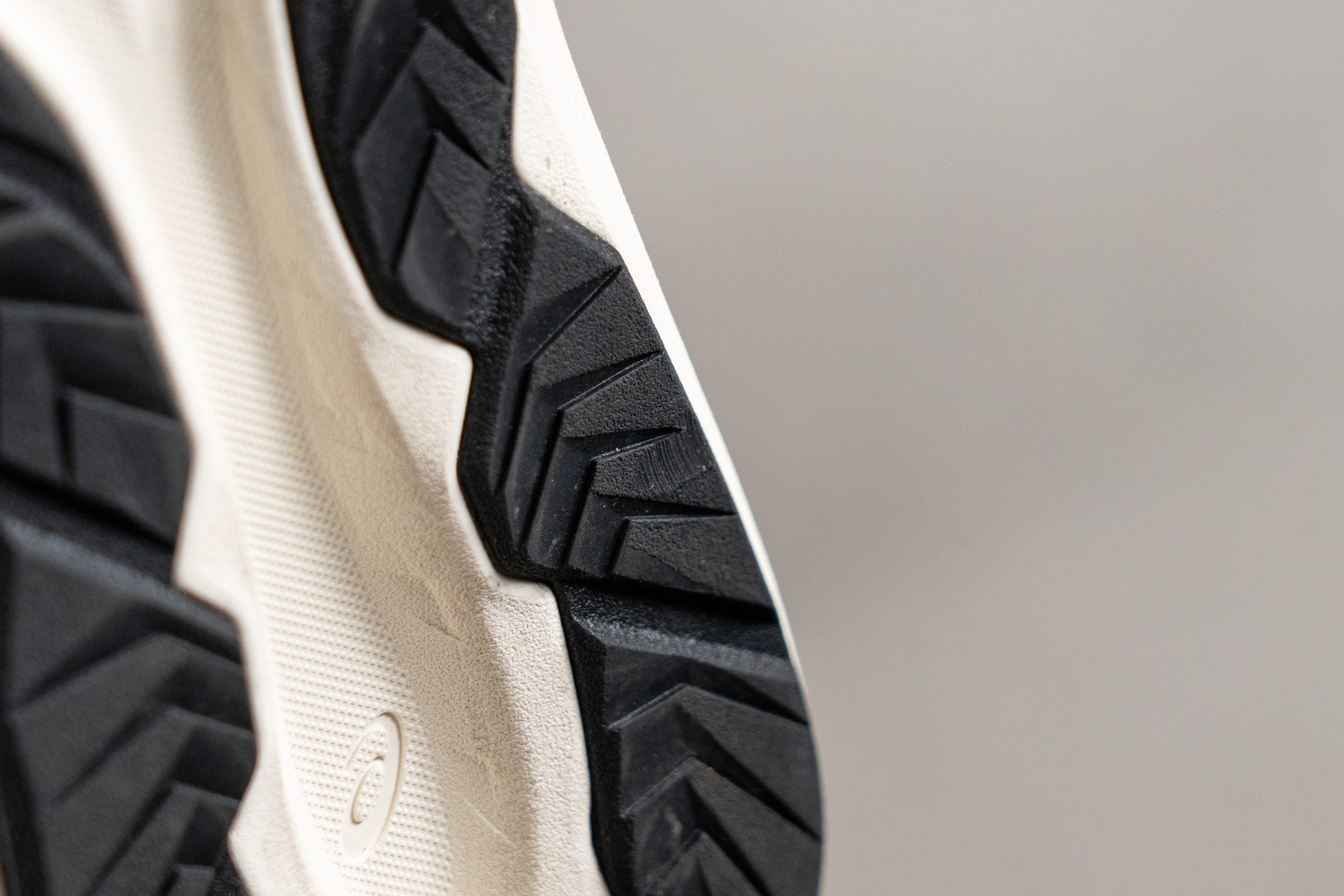
As such, we fully expect this shoe to last a good 500 miles of use before major signs of wear and tear appear. We'd even be comfortable peppering the occasional trail run on more manicured park trails without worrying about affecting the shoe's longevity.
| Dynablast 4 | 0.6 mm |
| Average | 1.1 mm |
Outsole thickness
We measured the Dynablast 4's outsole to be 4.1 mm thick, making it slightly thicker than average. This gives us plenty of material to wear through before impacting the shoe's traction.
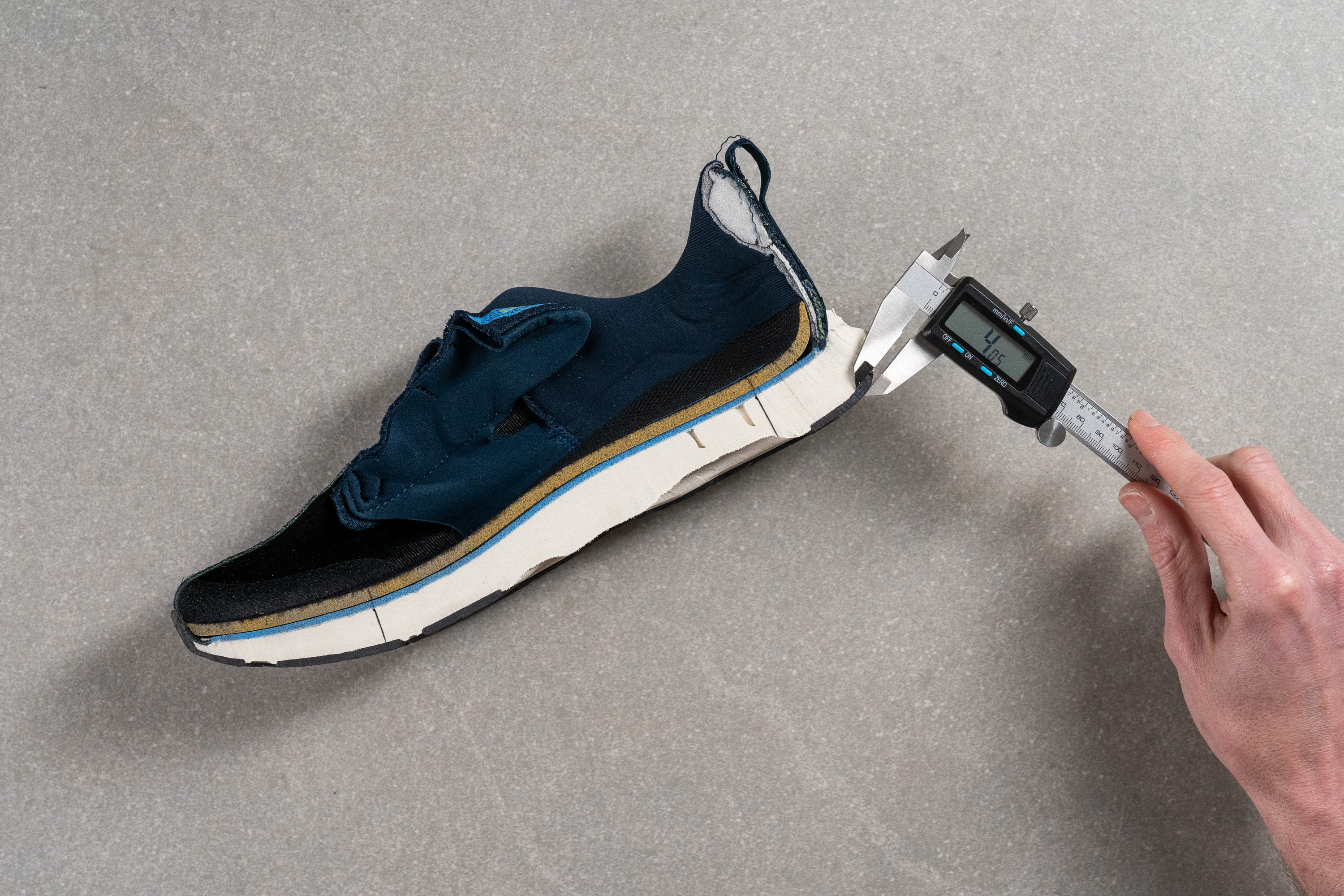
| Dynablast 4 | 4.1 mm |
| Average | 3.2 mm |
Misc
Insole thickness
The Dynablast 4's insole is quite chunky compared to our current lab average at 5.8 mm thick according to our caliper. This gives us a nice, soft surface within the shoe that our foot sinks into like a little memory foam mattress.
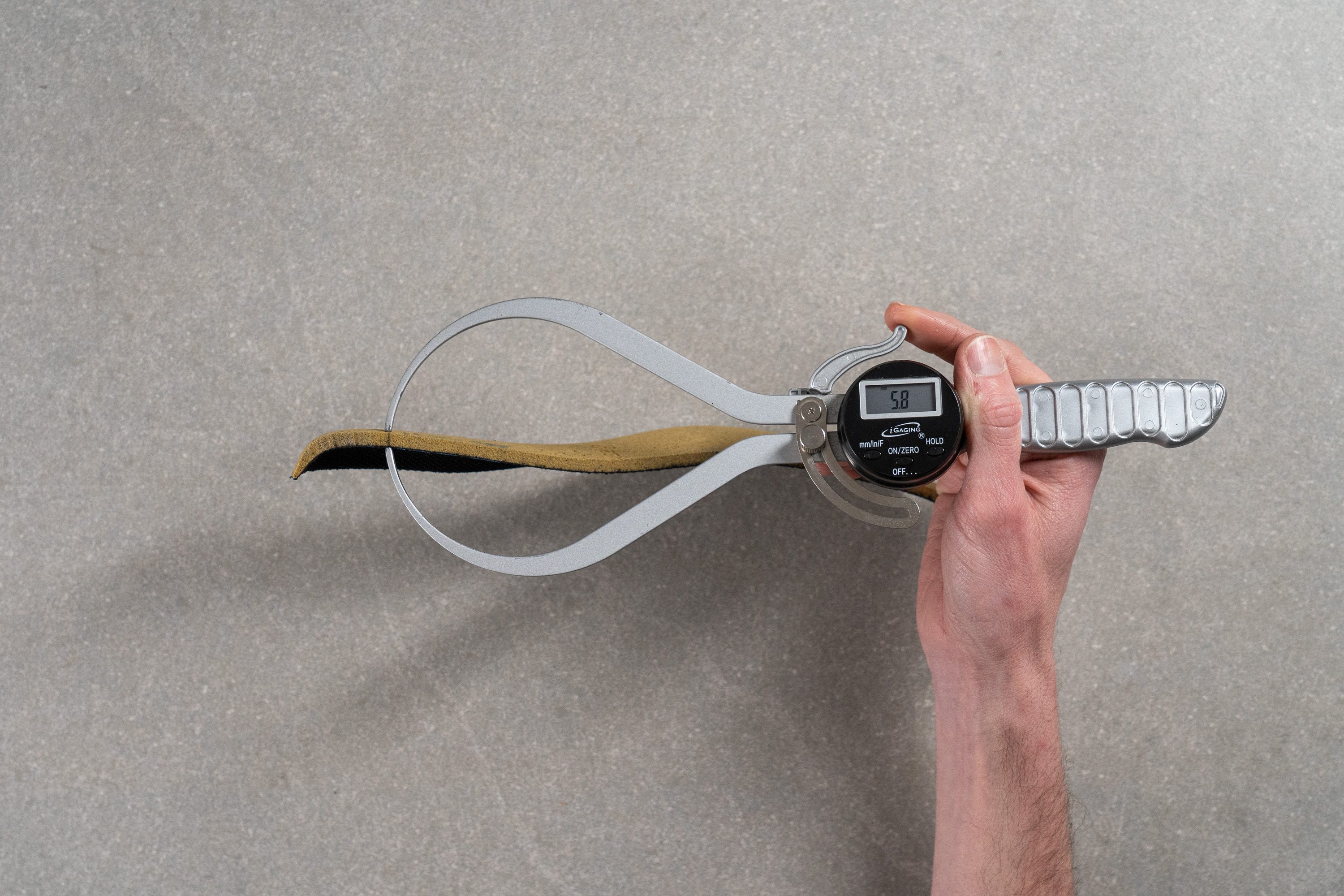
| Dynablast 4 | 5.8 mm |
| Average | 4.5 mm |
Removable insole
The insole isn't glued in, so replacing it in favor of a custom orthotic is possible whenever necessary.
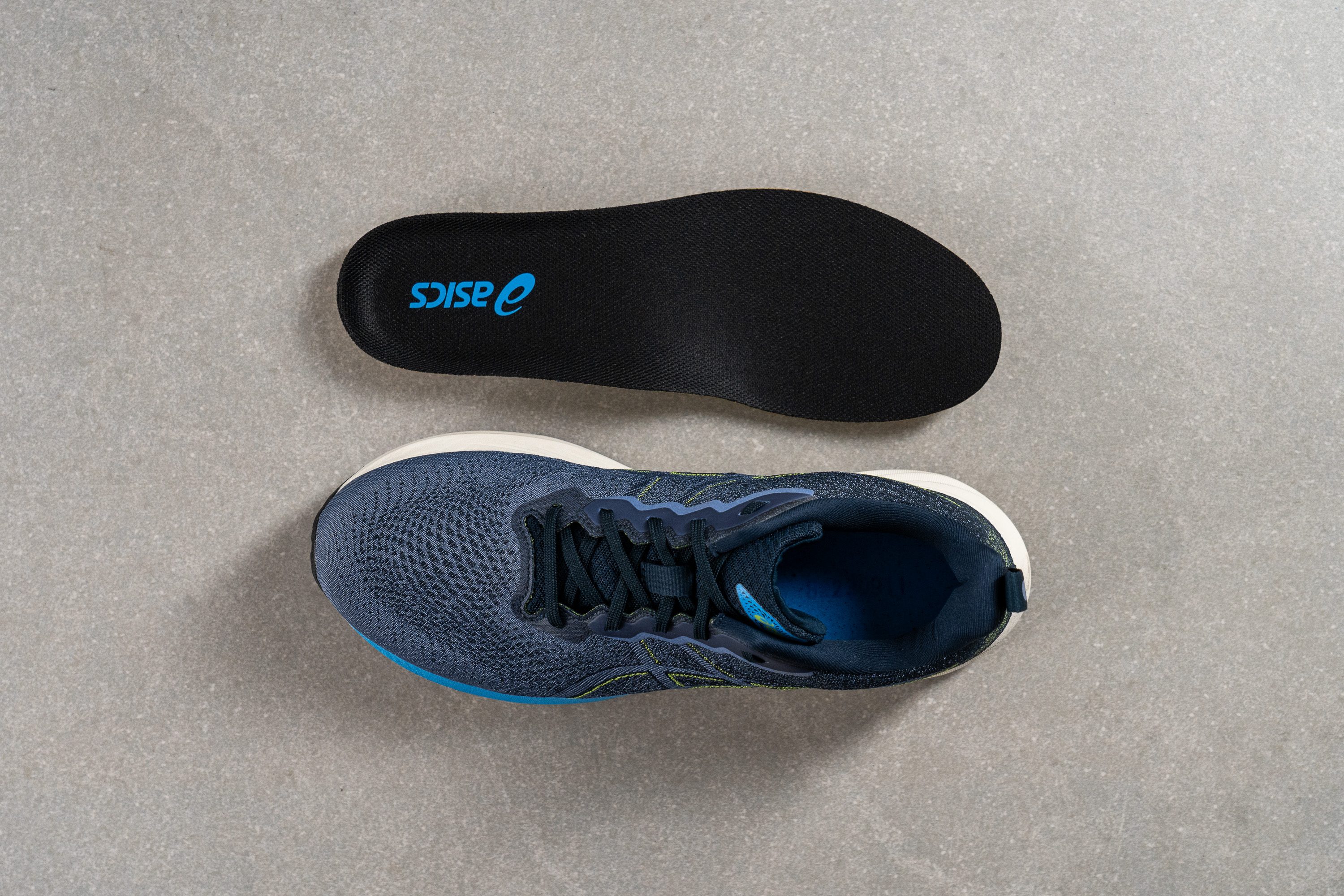
| Dynablast 4 | Yes |
Midsole softness in cold (%)
We let the Dynablast 4 chill in our to observe the effects of cold conditions on the midsole. After twenty minutes, we pressed our durometer against the foam once more and found that it only became 13.6% firmer. This means that the FF Blast foam is significantly more consistent than average and should still provide a nice and balanced level of cushioning no matter how cold it gets.
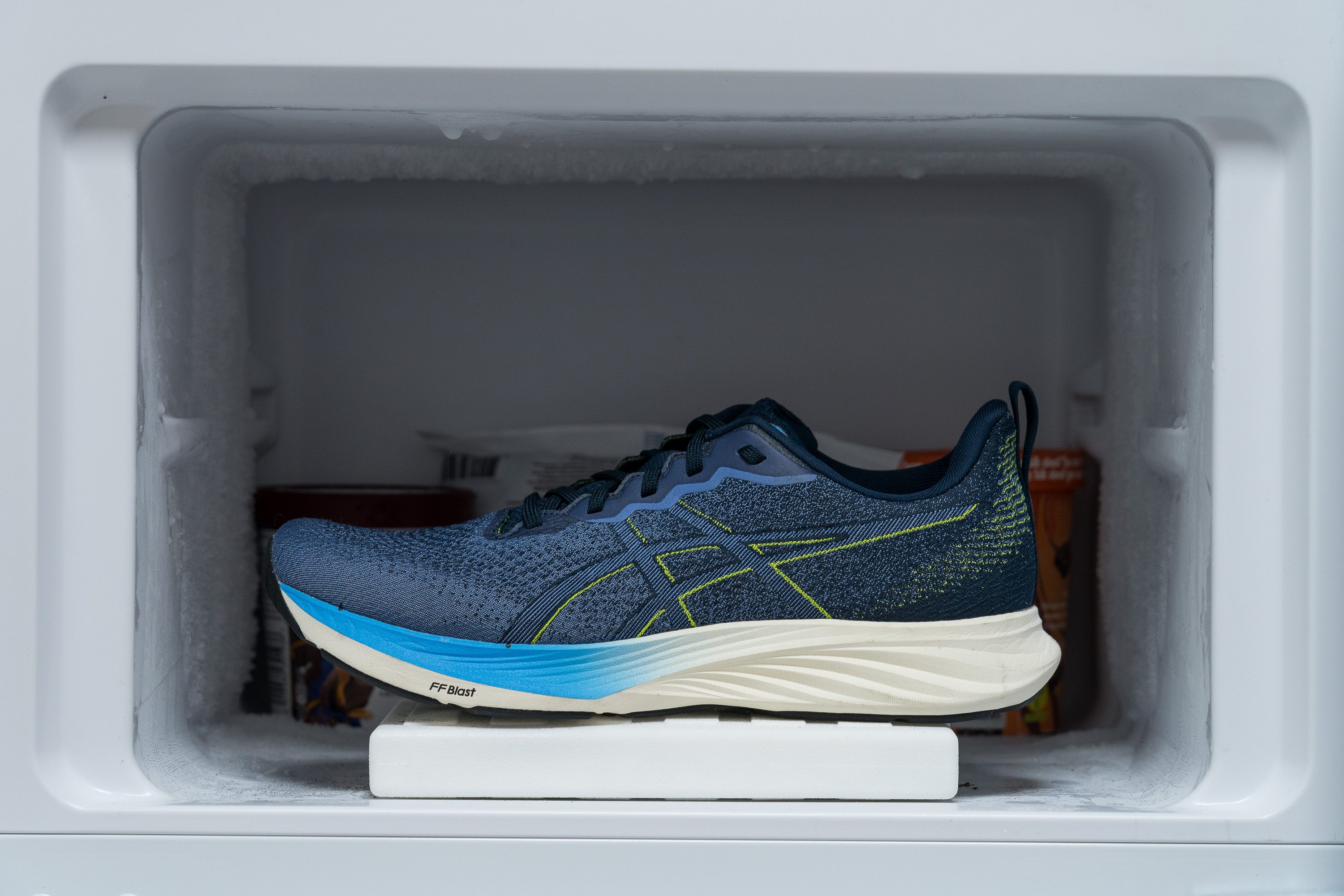
| Dynablast 4 | 14% |
| Average | 24% |
Reflective elements
There are no reflective elements to be found on the Dynablast 4. As such, we recommend using additional high-vis gear whenever using the shoe at night.
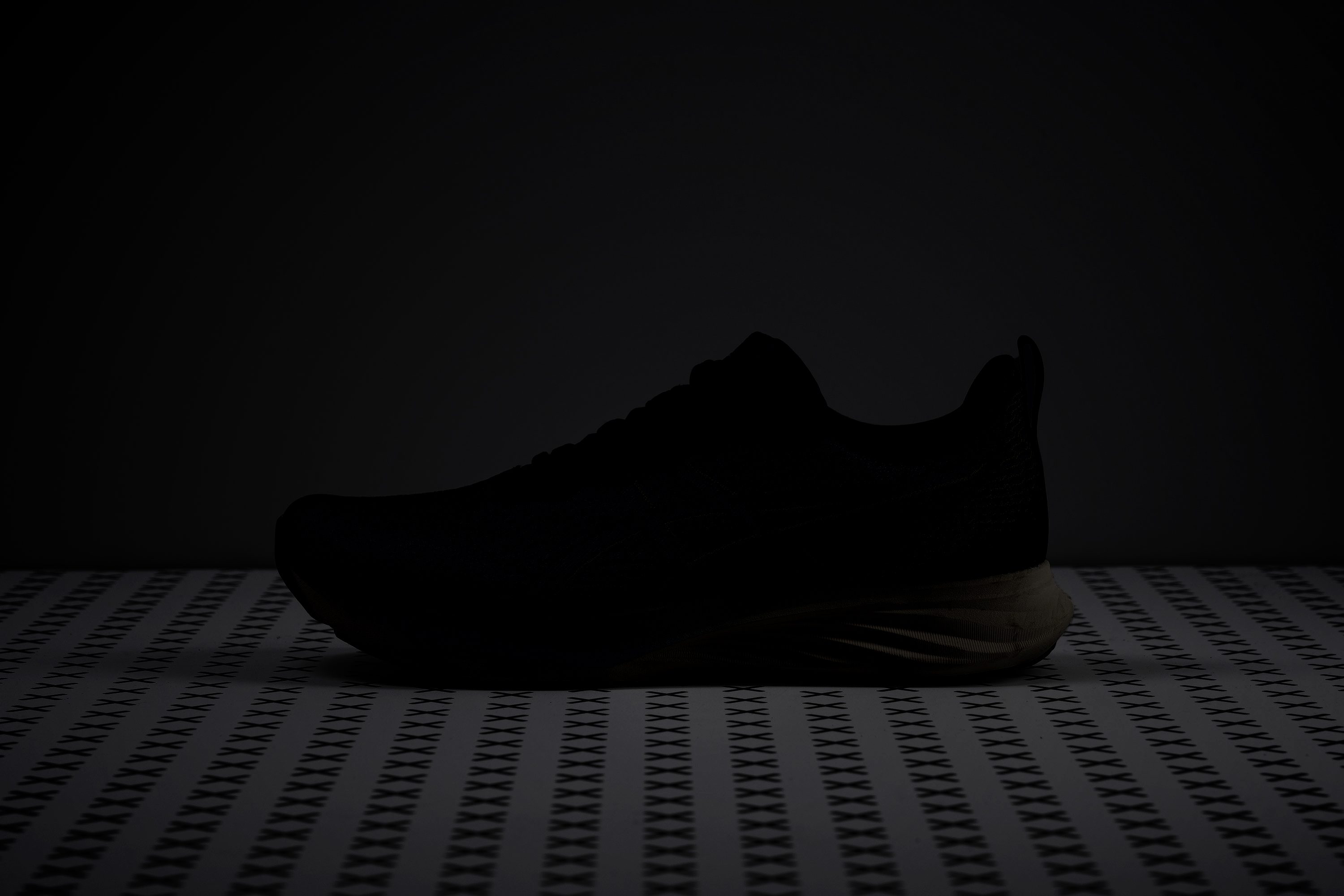
| Dynablast 4 | No |
Tongue padding
The Dynablast 4's tongue lacks padding compared to our current lab average at only 2.1 mm thick. This is the kind of race-ready tongue we expect from a performance shoe, not a daily trainer.
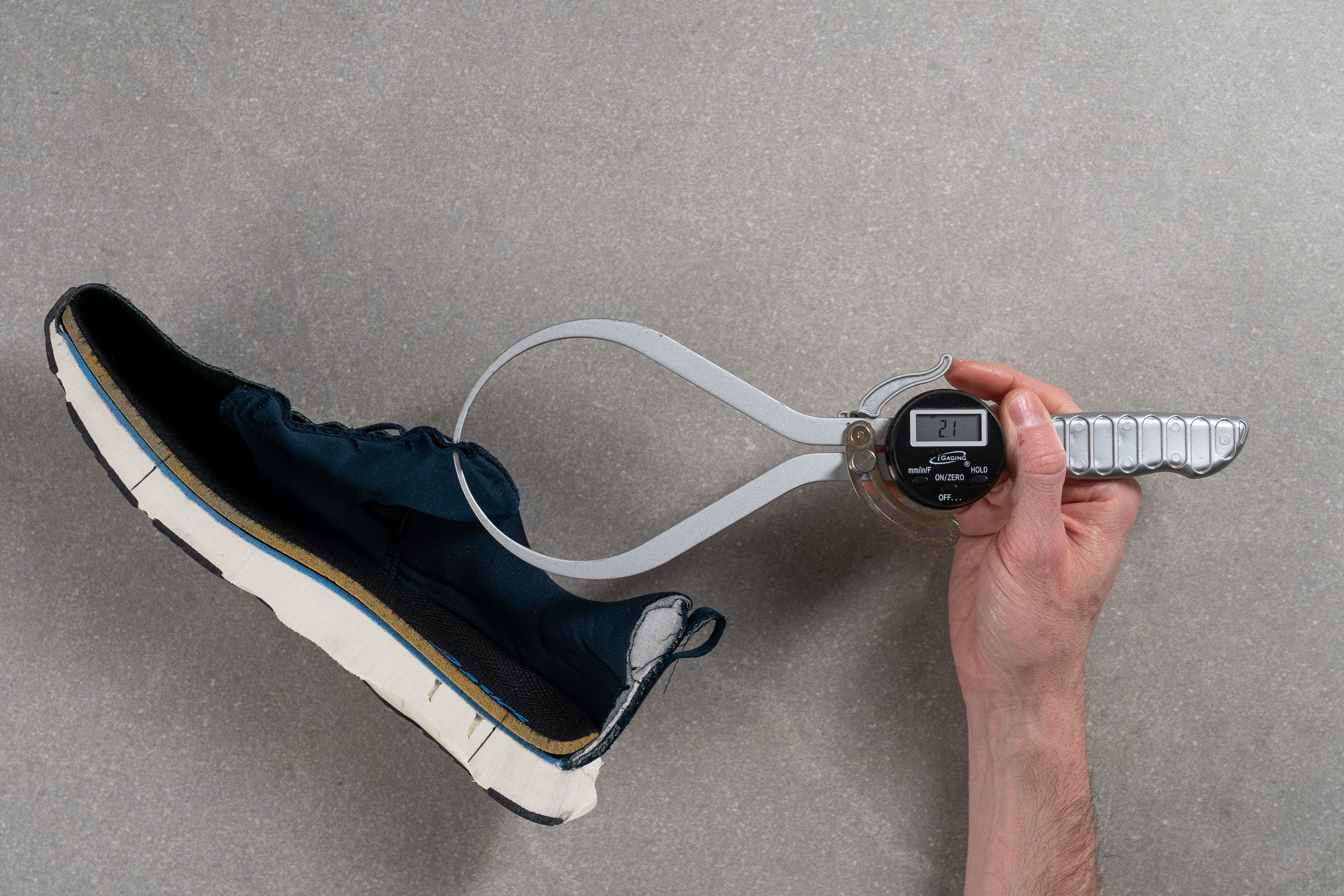
We think that a couple more millimetres of a buffer between our instep and the laces would have gone a long way to improve our overall comfort, especially during longer runs. For a shoe that effectively prevents lace bite, we recommend checking out the ASICS Jolt 4 instead.
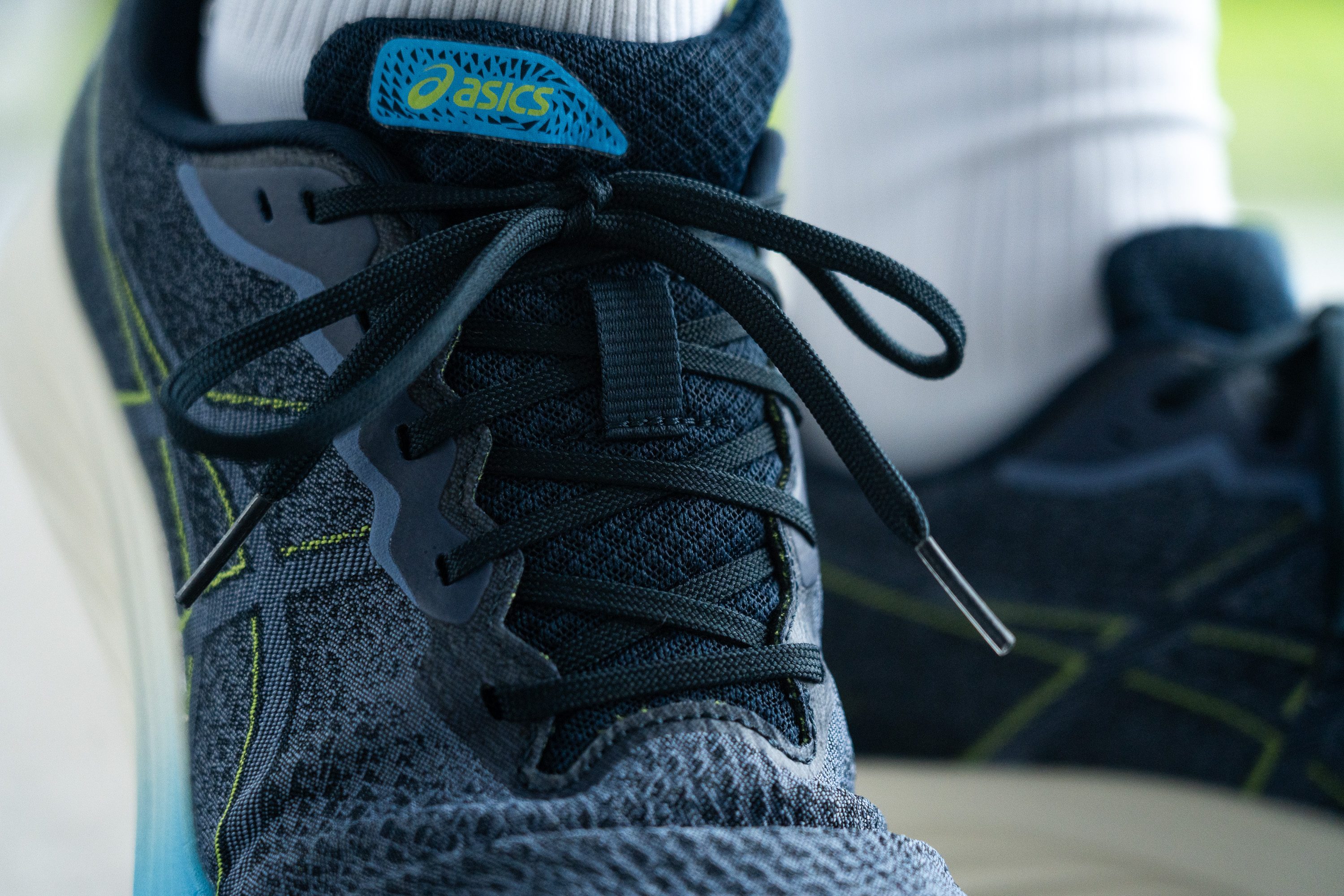
| Dynablast 4 | 2.1 mm |
| Average | 5.7 mm |
Tongue: gusset type
The Dynablast 4 features a tongue that's semi-gusseted on both sides. This not only helps mitigate the tongue from slipping to the side during our test runs but also contributes to a more secure-feeling fit at the midfoot.
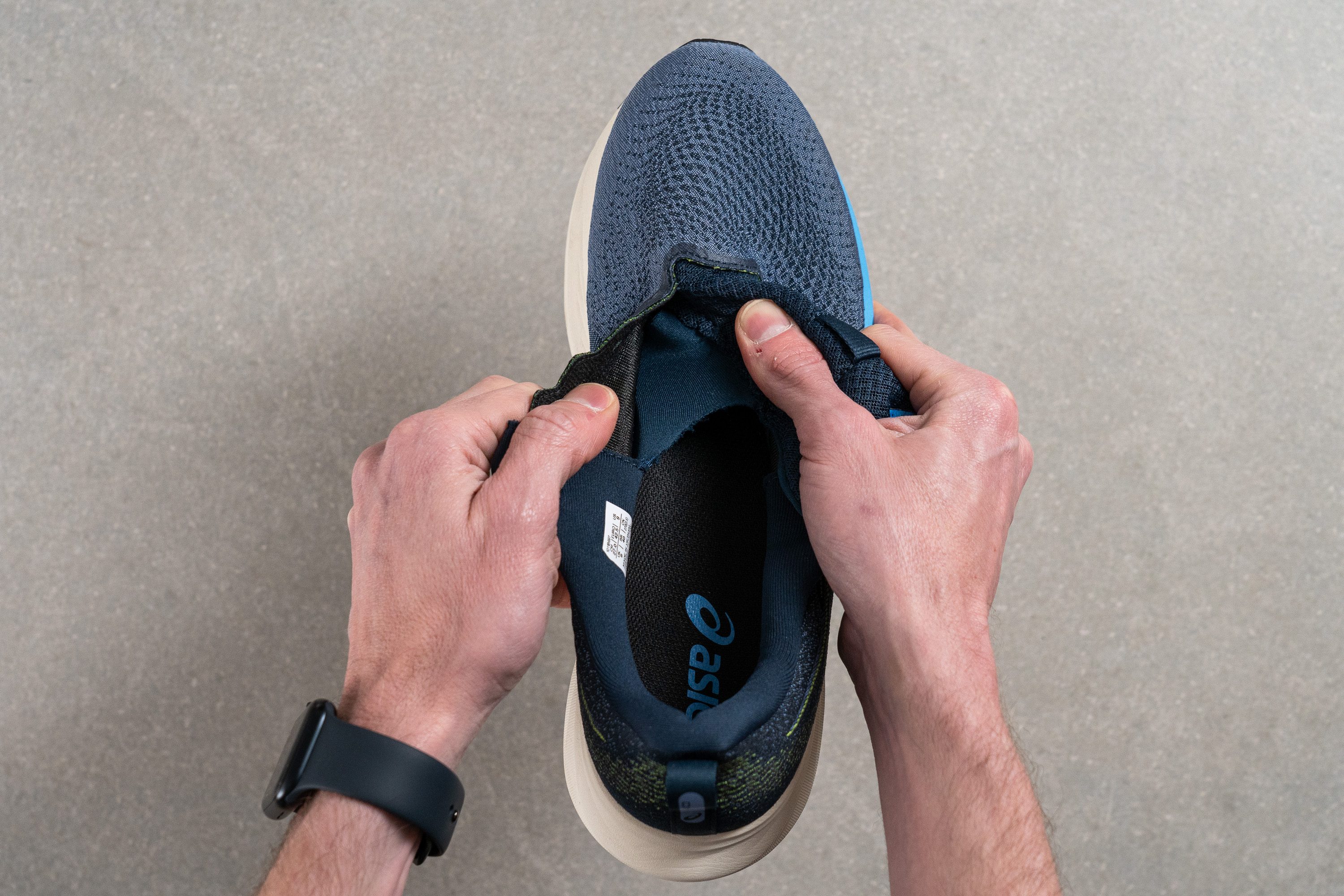
| Dynablast 4 | Both sides (semi) |
Heel tab
There's a handy little finger loop at the heel of the Dynablast 4 that makes sliding it on feel a little smoother and easier.
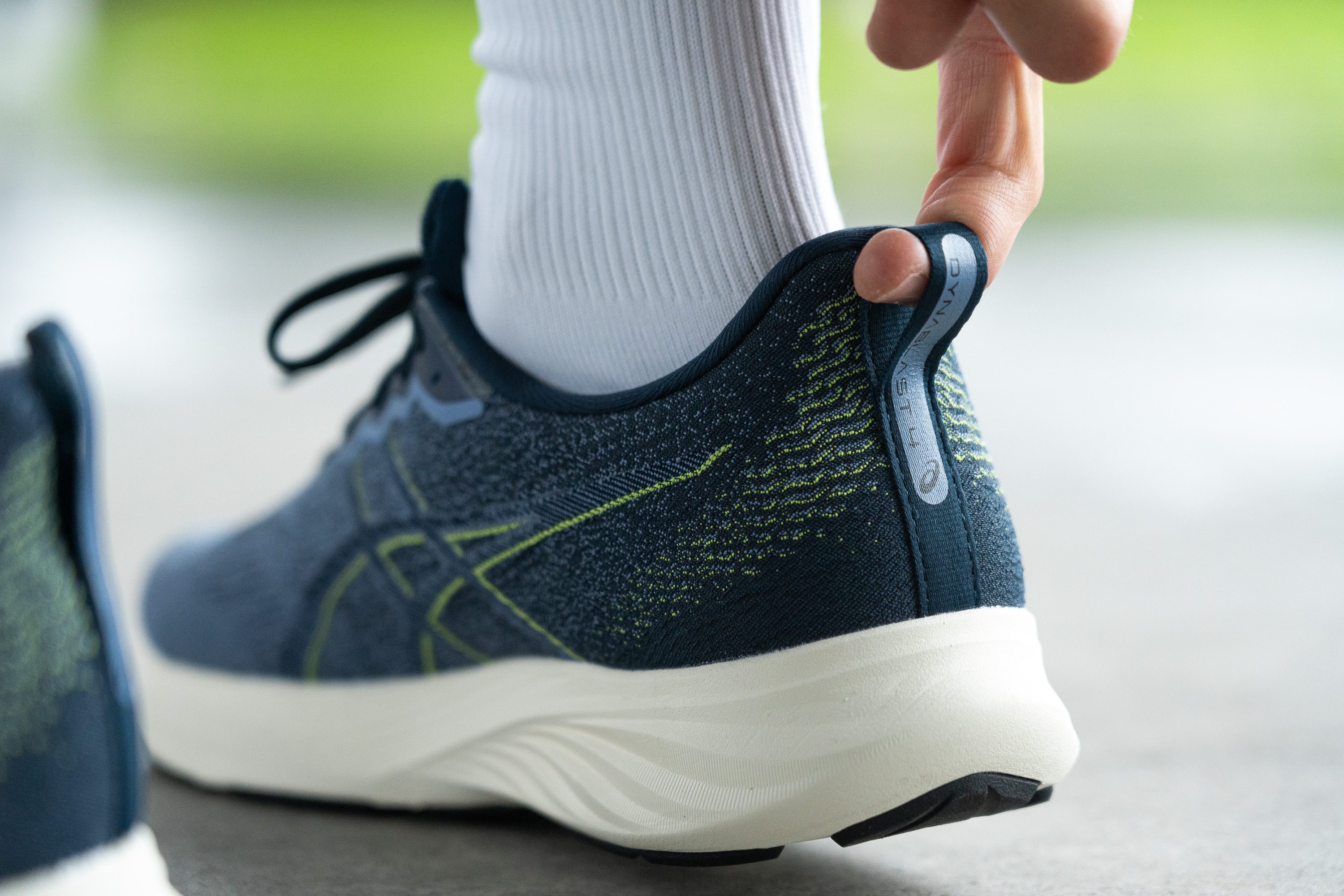
| Dynablast 4 | Finger loop |

